Solidarity in action: How racialised LGBTI activists are leading the way
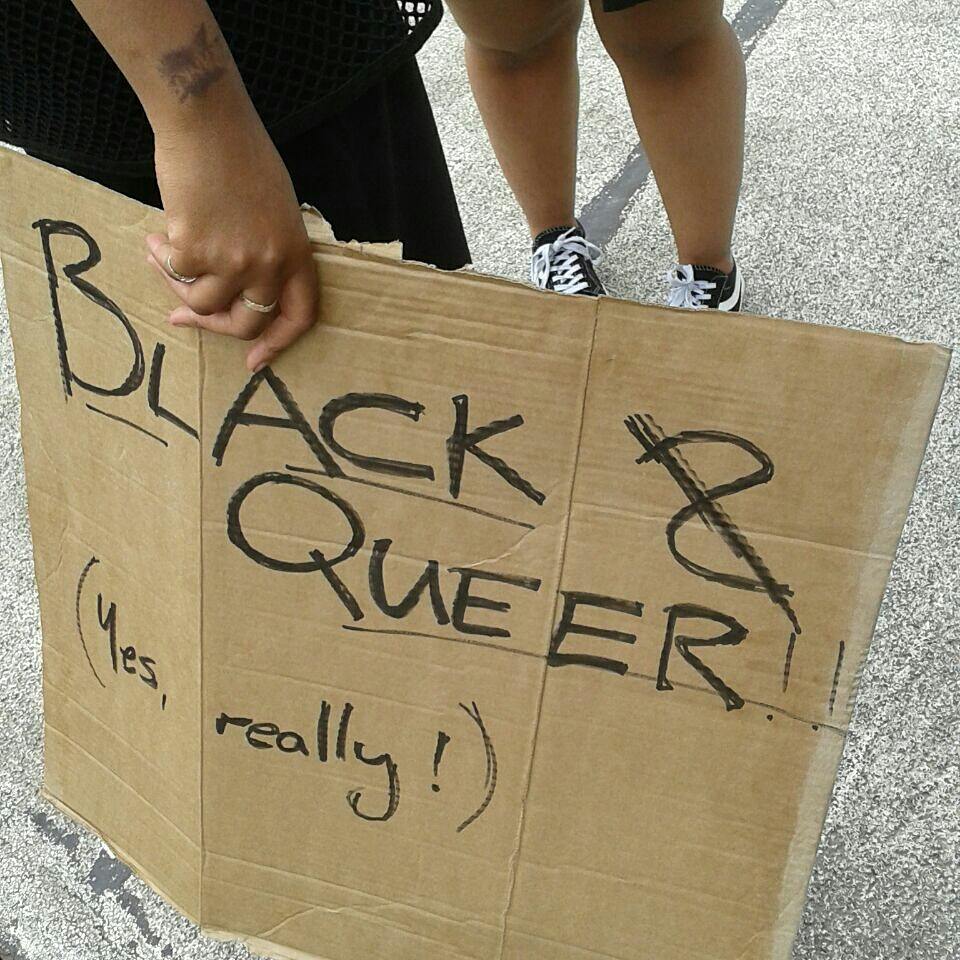
Across Europe, racialised LGBTI activists are redefining solidarity, not as a token gesture, but as a lifeline, a political act, and a practice of care. From fighting deportations to challenging power structures, their work offers a vision for a more just and transformative LGBTI movement.
“Solidarity is a technology of tenderness. It’s love. It’s protection. It’s grace. First to ourselves. Because we, as human beings, we always share what we are filled with.” (Faris Cuchi Gezahegn, Afro Rainbow Austria and House of Guramayle)
“To be radical, [solidarity as politics of affinity] has to be structural. That means dismantling colonisation, racism, LGBTI-phobia. It’s about redistributing discourse, resources, power.”(Pancho Godoy Vega, Colectivo Migrantes Transgresorxs)
With this new blog series, we’re sharing insights from the work of LGBTI organisations tackling injustice, racism, and the unique challenges faced by racialised LGBTI communities in Europe. We hope their stories and practices will inspire and resonate. We believe that solutions and approaches that include a few will pave the way and point to the solutions for many. You can read the previous blog in the series here.
For this blog, we’re shifting our focus to solidarity. What does it mean to racialised LGBTI communities? How is it understood, lived, and practised? And what would it mean for the broader LGBTI movement to engage in solidarity in a truly radical and transformative way?
To explore this, we spoke with three queer racialised groups: Queerstion Media (Sweden), Afro Rainbow Austria, and Migrantes Transgresorxs (Spain). Their stories are both deeply personal yet undeniably political.
Solidarity as a Lifeline
“I am a product of solidarity,” says Purity K Tumukwasibwe, Executive Director of Queerstion Media. “I became an activist by default. I was advocating for myself because otherwise my rights were just completely taken away from me.” From surviving police violence in Uganda and Kenya to being supported by a network of queer activists and allies in Europe, Purity’s journey is an example of how solidarity can be a lifeline, a practice that literally saves lives.
She shared a recent story of advocating for a fellow trans refugee in Sweden who was facing deportation to Uganda. “Everybody said that if the migration services decided on that, then it was over. But we said, ‘Let’s try’. I was so impressed by how everybody came on board.” Through a petition, media outreach, and institutional pressure, united in solidarity, they changed the outcome. The woman was granted residence in Sweden and permitted to stay. “When I see these members we support, who we come together for, I feel like I have contributed to a better world,” says Purity.
A Technology of Tenderness
For Faris Cuchi Gezahegn, member of Afro Rainbow Austria and co-founder of House of Guramayle, solidarity is both a political act and a spiritual practice. “To exist in this world as the person that I am, I am the manifestation of solidarity,” they say. Faris speaks of the collective effort that ensured their survival as a queer Ethiopian activist forced to flee, and how those acts of support were never transactional, but rooted in mutual care.
For Faris, solidarity isn’t about identity politics or rigid definitions. “It’s a technology of tenderness,” they explain. “It’s love. It’s protection. It’s grace. First to ourselves. Because we, as human beings. We always share what we are filled with.”
Yet, Faris also sees an urgent need for transformation within the LGBTI movement itself. “We harm one another. We are often encircled by the violence projected onto us, and we replicate it – in our accountability practices, in our scarcity mindsets, in how we treat one another.” Their call is for radical healing: to resist punitive impulses and lead with softness, honesty, and vulnerability.
Beyond Solidarity Towards Structural Change
The collective Migrantes Transgresorxs challenge the word ‘solidarity’. “We prefer to talk about the politics of affinity,” says Alex Aguirre Sánchez. “Solidarity carries a violent historical weight. It comes from religious charity, and religion has been violent for us.”
Instead, they emphasise ancestral bonds and community-to-community alliances. “We stay together, and together we are stronger,” says Kimy/Leticia Rojas. “It’s about sharing food, music, lived experience, and ancestral knowledge.”
Pancho Godoy Vega adds: “To be radical, it has to be structural. That means dismantling colonisation, racism, LGBTI-phobia. It’s about redistributing discourse, resources, power.” The group, formed in Madrid in 2009, has always intertwined the personal and political – fighting for trans migrants, critiquing whiteness in LGBTI spaces, building alliances from the bottom up.
All the activists featured in today’s blog share this in common: they call for a solidarity that is not superficial or symbolic, but material, embodied and rooted in justice. It means funding grassroots work. Sharing platforms. Redistributing power. Above all, it means healing.
As Purity puts it: “There is always going to be two sides of that coin, those with resources, and those at the margins shouting that we are struggling. Bridging that gap means planning together. It means putting grassroots like ours on the agenda.”
Freedom to Protest Is Under Attack – Why It Matters for Everyone

When states suppress public protests, they don’t just target activists, they erode the rights of all citizens. The latest crackdowns in Hungary, Turkey, and beyond show why defending freedom of assembly is more urgent than ever.
On 8 March, people took to the streets to mark International Women’s Day, but their right to march was actively suppressed in many places. From Kazakhstan to Turkey and Azerbaijan, authorities used intimidation, force, and legal threats to prevent women from gathering, exposing a broader pattern of restrictions on civil society. Meanwhile, in Hungary, the government has escalated its efforts to suppress freedom of assembly, passing a law that explicitly bans Pride marches and introduces surveillance measures to deter participation.
Crackdowns on feminist and LGBTI protests
Ahead of Women’s Day, Kazakhstan authorities detained LBT activists from Feminita, using penal and administrative tactics to suppress their activism. In Turkey, nearly 200 people were detained in Istanbul alone, with police blocking demonstrations across multiple cities on the 8th. Among those detained was a trans woman, underscoring how trans activists are often specifically targeted. In Azerbaijan, feminist activist Rauf Heydarov was sentenced to 30 days of detention after attempting to display a poster on 8 March, with fabricated charges used to justify their arrest. These cases illustrate how states use arbitrary detentions and legal mechanisms to intimidate activists and restrict their right to assemble and protest.
Hungary: From threats to an outright ban on Pride
In Hungary, restrictions on freedom of assembly have intensified dramatically. What started as a “child protection” law—banning the “depiction or promotion” of homosexuality to minors and widely condemned by EU leaders, the European Commission, and the Council of Europe as violating international human rights standards—has now escalated into a nationwide ban on Pride marches. The new law not only criminalises these events but also permits the use of facial recognition technology to track and penalise participants. Despite this, the Budapest Pride organisers remain committed to marching, demonstrating the resilience of the movement in the face of increasing authoritarianism.
A key indicator of democratic health
These events in Hungary, Turkey, Kazakhstan, and Azerbaijan are not isolated incidents. They reflect a broader trend in which governments seek to silence peaceful and legitimate dissent by restricting public demonstrations, targeting women’s rights and LGBTI activists, and using legal measures to suppress fundamental rights. The ability to protest is a key indicator of democratic health. When states criminalise peaceful assembly, they erode not just rights for LGBTI people and women, but the broader foundation of civil liberties for all.
As these threats grow, the international response must be clear. Governments, the EU, and international institutions must hold states accountable for these violations and stand in firm defence of the right to protest. Freedom of assembly is not just an LGBTI or feminist issue; it is central to human rights and democracy. When one group’s right to gather is restricted, the ability of all people to organise and demand change is at risk.
The human right to assemble and protest must be protected, defended, and upheld.
From 9 Activists to a Worldwide LGBTI Movement
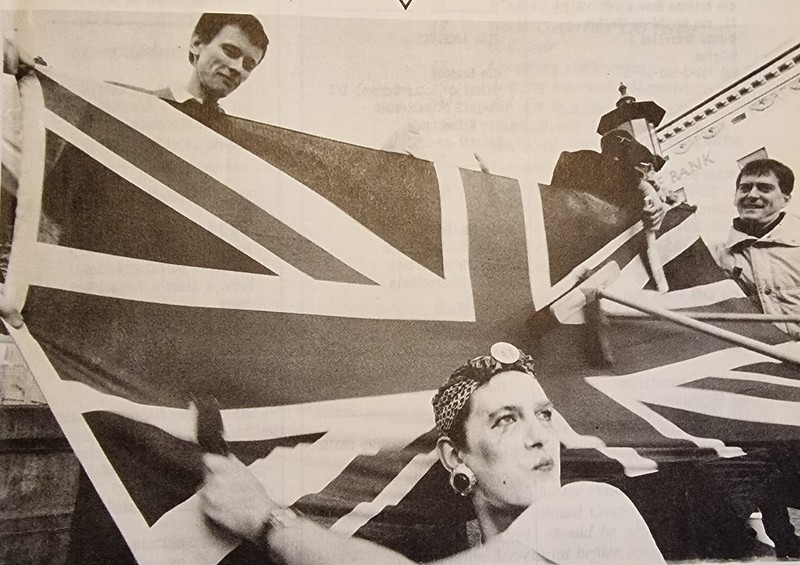
A newly released archive of over 2,000 photographs charts a journey that grew from a small meeting of activists in the UK almost 50 years ago to an international LGBTI movement still striding forward for human rights and equality today.
In 1978, a pivotal moment in LGBTI history unfolded in the United Kingdom, when activists from nine countries gathered in the city of Coventry to establish the International Gay Association (IGA), launching a coordinated global effort for LGBTI rights. Acting on the need for a dedicated space for lesbian activism, the International Lesbian Information Service (ILIS) was founded in 1980. Over time, IGA evolved to become the International Lesbian, Gay, Bisexual, Trans and Intersex Association (ILGA), integrating broader identities into its advocacy. In 1996, ILGA-Europe was established as its regional branch, responding to the distinct political and legal landscapes of the European movement.
The ILGA & ILIS History Collection, meticulously curated by long-time activist Nigel Warner, offers a profound insight into these formative years of the LGBTI movement. Nigel’s dedication to documenting and preserving this history stems from his deep ties to ILGA, where he served in various roles, including overseeing its finances from 1987 to 1994. He also served in ILGA-Europe, as board member and treasurer from 2000 to 2005, and as our representative at the Council of Europe from 1998 to 2018.
Comprising over 2,000 photographs contributed by 80 activists, the collection documents significant events and themes from 1978 through the 1990s. It not only shows the public demonstrations and conferences but also provides contextual information, including contemporary documentation and personal accounts, painting a comprehensive picture of the early international LGBTI movement.
Today, as we witness a resurgence of right-wing ideologies and policies threatening LGBTI rights on an international scale, this collection serves as a poignant reminder of our community’s resilience. The challenges we face are formidable, with countries electing openly LGBTI-phobic leaders, and enacting laws that roll back hard-won rights. Yet, the history captured in these photographs reminds us that the movement has weathered significant adversities before.
The ILGA & ILIS History Collection stands as a testament to the power of solidarity, courage, and unwavering commitment. And if we remember our past, we can inform our present and inspire our future. As we navigate the current challenges, let this collection be a source of strength and a reminder that, together, we can overcome adversity and continue the march toward equality.
Explore the ILGA & ILIS History Collection and join us in honouring the legacy of those who paved the way for the rights we uphold today.
How BIPOC queer activists are using artivism as resistance
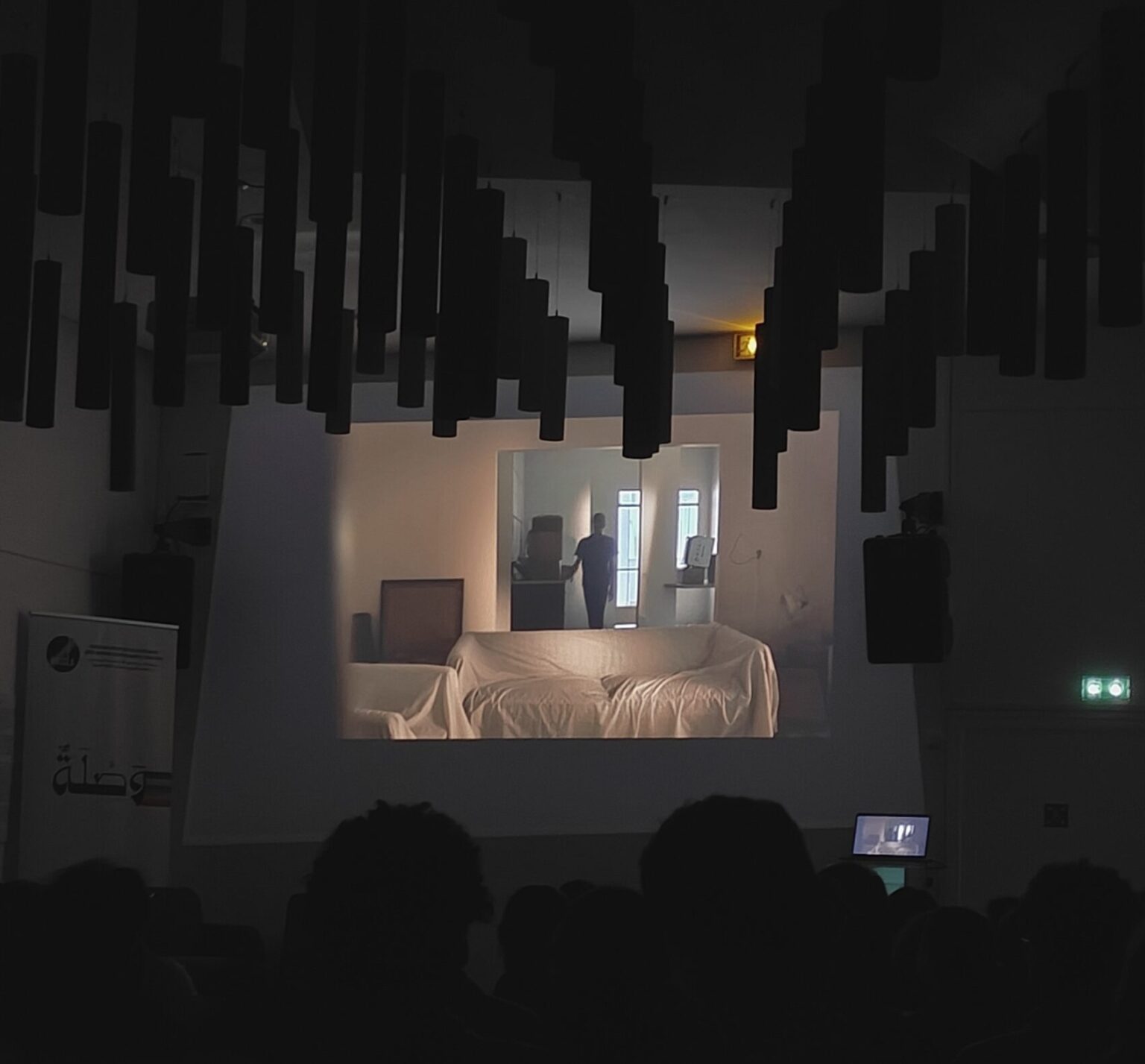
Art has always been a powerful tool of resistance, allowing the oppressed to share their truths and experiences. For many Black, Indigenous, or People of Colour (BIPOC1) LGBTI activists, it is more than expression—it’s a survival tool, a way to build community, a political statement, and a means to reclaim joy.
With this new blog series, we’re sharing insights from the work of LGBTI organisations tackling injustice, racism, and the unique challenges faced by racialised LGBTI communities in Europe. We hope their stories and practices will inspire and resonate. We believe that solutions and approaches that include a few will pave the way and point to the solutions for many. You can read the previous blog in the series here.
Across Europe, LGBTI collectives are harnessing film, music, poetry, and performance to tell their stories, connect with others, and challenge dominant narratives. In today’s blog, we explore how four different racialised queer groups use art in their activism.
Wassla Ciné Queer: Film as a lifeline
For Wassla, a queer cultural organisation based in Paris that works with migrants, film is more than entertainment – it is a lifeline. Their initiative, Ciné Queer, curates short and feature-length movies directed by Arab filmmakers that explore LGBTQIA+ experiences in Arabic-speaking communities. More than just screenings, these events spark critical conversations. Often followed by discussions with directors, the gatherings create a space where people can process what they see on screen, debate social issues, and reflect on their own realities.
At Wassla, there is no distinction between volunteers and participants; everyone plays a role in shaping the community. Many of their screenings feature works by their own members, amplifying voices that might otherwise remain unheard. With audiences sometimes reaching 80 people or more, Ciné Queer combats isolation and fosters solidarity in a safe and empowering space. For Wassla, film is not just about representation, it is about connection, healing, and breaking the silence.
Sadiqa and LIMBO queer exilic narratives: Music as a battle cry
“I am a reality, not an illusion.” These words, from Sadiqa’s song The Voice of the Queer, embody the defiant spirit of many BIPOC queer artists who refuse to be erased. Sadiqa was part of Art for Change, an initiative that examined art as a tool for solidarity and engaged scholarship. During the COVID-19 pandemic, Art for Change brought together queer refugee artists, offering a space to create and share music, poetry, film, and design.
That work continues through LIMBO queer exilic narratives, a platform for queer refugees in the Netherlands to tell their stories through art, to challenge the laws and structures that criminalise their existence, and to carve out spaces of belonging. Sadiqa’s music does not ask for permission; it demands recognition. Their lyrics are a protest against laws such as Article 489 of the moroccan law, which criminalises the sexuality of queer people, and a call out to all systems of oppression that seek to control and suppress marginalised communities:
“The voice of the queer is everywhere, calling against oppression… now we are all aware of the system’s malfunctions”
صوت الكوير في كل مكان، ينادي ضد الطغيان… مازال الحق يبان، و كلشي يرجع مزيان
Rainbow Mind UK: Art as radical self-care
For Rainbow Mind UK, creativity is a crucial part of their radical self-care approach. Working with LGBTI people of colour and refugee communities in the UK, they realised that traditional self-care practices often required participants to re-live painful experiences. Instead, they turned to art and music as a means of engagement, connection, and healing.
One of their most popular practices is the Queer Pencil Disco, where participants use drawing as a form of self-expression, and another involves recalling empowering song lyrics when words are hard to find. For a group of LGBTQ+ refugees, ‘Flowers’ by Miley Cyrus became an anthem of resilience. These practices offer creative expression and make self-care accessible and joyful. Rainbow Mind UK uses art to help people take control of their stories without re-experiencing trauma.
Break Isolation Group: Slam poetry as protest
For Break Isolation Group, spoken word and slam poetry are forms of protest, catharsis, and survival. Many members are queer racialised asylum seekers and refugees who face state repression, deportation threats, and systemic silencing in Germany.
Ann and Rose from Break Isolation Group explain that poetry provides them with a platform to express anger, tell their stories, and build community when traditional political spaces are closed to them.
“We are not able to speak openly in many spaces anymore,” Ann explains. “So now, we turn to slam poetry. Art allows us to purge, to bring experiences to life in a way that just talking about them doesn’t.”
For Break Isolation Group, redefining what counts as ‘art’ is part of their activism. Rose points out that in many BIPOC cultures, storytelling has always been woven into song and dance, but Western frameworks often fail to recognise these as legitimate art forms. “Our ancestors sent messages through music; this is nothing new.” Through their work, Break Isolation Group challenges Eurocentric definitions of art and reclaims creative expression on their own terms.
New funding
ILGA-Europe continues its commitment to providing funds and support for this part of LGBTI movement that addresses intersectional impacts of injustice, racialisation, racism and supremacy. On 30 January 2025, we launched a new call for proposals to support European groups working for and with racialised LGBTI communities. This is the third cycle of this programme. Apply by 30 March 2025, 23.59 CET.
- BIPOC is one of many abbreviations that our partner organisations use to self-identify the racialised communities they belong to. We use it here while acknowledging that there are other terms that might be more apt in different contexts by various groups, such as BAME (Black, Asian, and minority ethnic), BAPOC (Black, Asian and People of Colour), LGBTQI+ individuals of African descent, Arab queers from SWANA region (Southwest Asian and North African region) to name a few that are used by organisations we work with. ↩︎
A Call for Urgent Action Against Rising Anti-LGBTI Hate
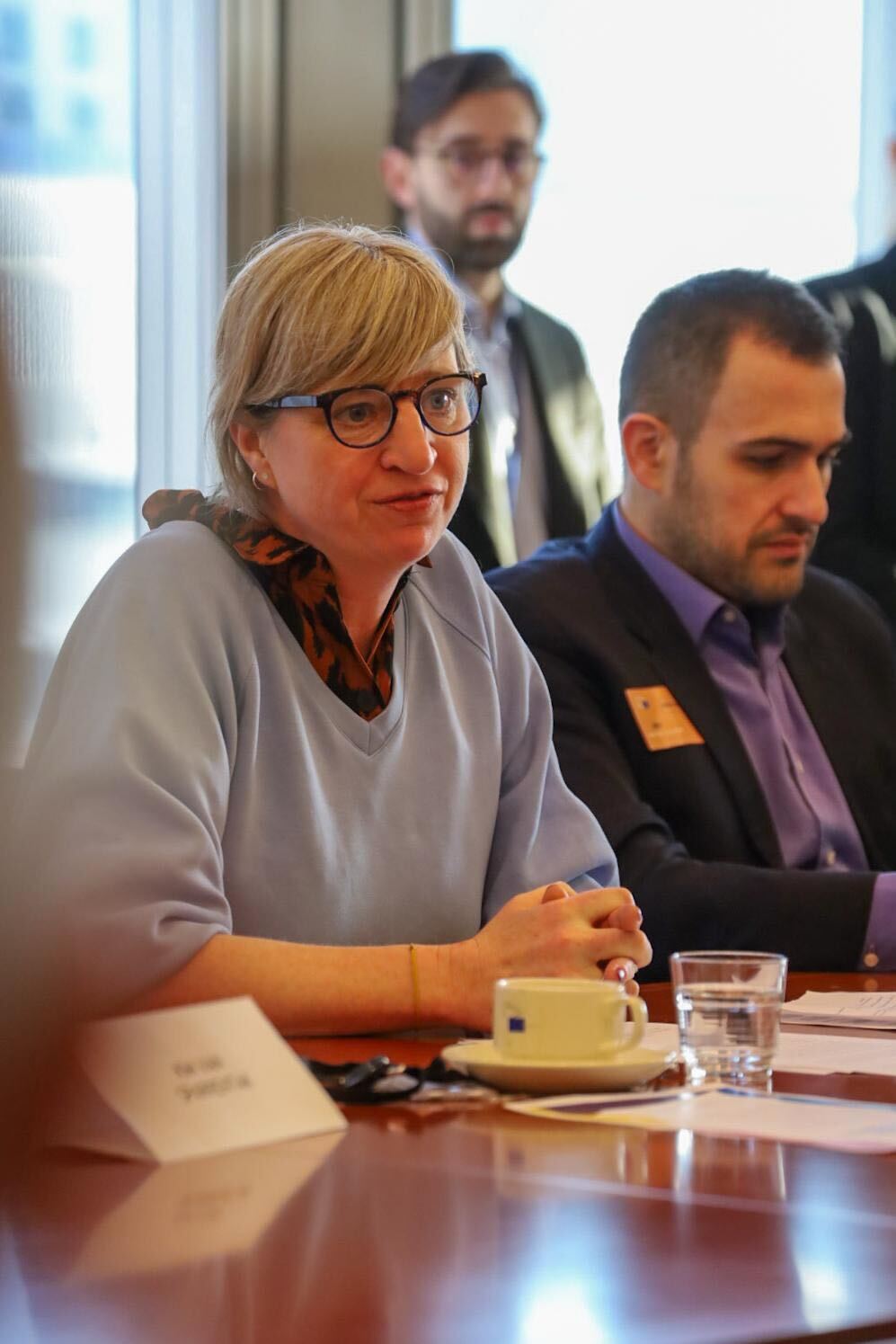
At the launch of our 2025 Annual Review, ILGA-Europe’s Advocacy Director, Katrin Hugendubel delivered a stark warning about the growing wave of anti-LGBTI hate, misinformation, and legislative attacks across the region. As governments weaponise discrimination to undermine democracy, she called for urgent political action to protect fundamental rights and freedoms. In today’s blog we share the full text of her speech.
Our Annual Review of the Human Rights Situation of LGBTI People in Europe and Central Asia, released this week, strives to provide a clear and comprehensive overview of the realities on the ground. The findings are based on individual cases, notable events, and legislative, political, and social developments, as well as data gathered from our own work and insights from LGBTI activists across the 54 countries covered in the report.
In recent years, LGBTI activists and organisations across Europe and Central Asia have repeatedly highlighted the worrying rise and normalisation of hate and violence in our region, including numerous attacks on LGBTI rights that systematically undermine fundamental freedoms.
The 2025 Annual Review once again evidences a clear increase in hate and violence. Furthermore, it illustrates how ongoing LGBTI-phobic hate and misinformation campaigns have laid the groundwork for legislation such as anti-propaganda and foreign agent laws. These laws, which ostensibly target LGBTI rights, actually extend much further—introducing censorship, stigmatisation, and persecution of human rights defenders and opposition voices; anti-democratic interference in elections through disinformation campaigns; and, ultimately, laws that erode fundamental freedoms and the principles of democracy. LGBTI rights are being used as an entry point for broader repressive measures.
LGBTI-phobic hate speech, sexism, and misogyny are increasingly normalised, often fuelled by public figures, including political and religious leaders and state institutions. Politicians in several countries, including Austria, Belgium, Bosnia & Herzegovina, Czechia, Moldova, and Romania, have weaponised discriminatory narratives against LGBTI people during election periods.
To cite just a few examples: in Austria, the far-right FPÖ spoke of “transgender brainwashing” and sought to cut taxpayer funding for what it termed “queer experiments”. In Belgium, Vlaams Belang repeatedly invoked the notion of “gender madness”. The President of Republika Srpska in Bosnia & Herzegovina was fined for hate speech during the election campaign.
The Georgian Elections Observatory (GEO), which focuses on fact-checking pre-election narratives, analysed statements made by senior members of the ruling Georgian Dream party, revealing that ‘LGBT propaganda’ was framed as a Western imposition and linked to a perceived threat to national survival. A similar misinformation campaign in Moldova suggested the country would be overrun by the Western LGBTI agenda ahead of the October elections. In Romania, Călin Georgescu’s electoral campaign during the first presidential election round intensified hate speech against the LGBTI community, even advocating for the re-criminalisation of homosexuality in the Penal Code.
Hate crimes and violent incidents have been reported in the vast majority of countries covered in this report. In Albania, these include stoning attacks against lesbian activists and physical assaults on trans women, with no accountability measures taken. A migrant trans woman was murdered in a hotel room in Copenhagen. Just one day after the Georgian Parliament passed its anti-LGBTI law, celebrity trans woman Kesaria Abramidze was found brutally murdered in her apartment.
In Armenia, while the successful prosecution of the country’s first hate crime against a gay man marks progress, violence against trans people remains unaddressed, and draft anti-discrimination legislation continues to stall. In Germany, during Pride season (June–September 2024), the Centre for Monitoring, Analysis and Strategy documented a surge in extremist mobilisation against Pride events across 27 cities, involving violence and intimidation. The Federal Ministry of the Interior reported 22 protests in this period.
The French Ministry of the Interior released a report showing a 13% increase in anti-LGBTI offences in 2023, with assaults, threats, and harassment rising by 19%, totalling 2,870 cases. The country chapter for France this year lists numerous homo- and transphobic attacks, including two transfemicides. Similarly, Italy recorded a troubling increase in bias-motivated violence in 2024.
Governments are actively fuelling anti-LGBTI sentiment, often followed by legislative proposals restricting freedom of expression, association, and fair elections. In seven countries across the region, so-called ‘LGBT propaganda’ laws, which seek to criminalise LGBTI visibility, ban content, silence activists, and restrict freedom of assembly, were either discussed, proposed, or adopted.
In Kazakhstan, parliamentarians proposed including “LGBT propaganda” in the list of extremist crimes under the Criminal Code, with penalties of up to seven years’ imprisonment. In Romania, a draft law was introduced to censor LGBTI issues in schools, the media, and public spaces, also seeking to ban Pride marches and related public assemblies.
The most far-reaching of such laws came into force in Georgia last December. The “Protection of Family Values and Minors” law prohibits non-heterosexual people from adopting children, prevents
trans and intersex people from changing their gender markers on documents, outlaws public gatherings that promote same-sex relationships, and bans educational institutions from presenting what the government terms “LGBTI propaganda”. It also prohibits legal gender recognition, criminalises medical procedures related to transitioning, equates same-sex relationships with incest, and designates 17 May as a “Day of Family Purity and Respect for Parents”.
Other countries have focused on targeting the education sector, restricting or outright banning LGBTI topics from curricula and awareness-raising initiatives. In Hungary, teachers fear mentioning SOGIESC (Sexual Orientation, Gender Identity and Expression, and Sex Characteristics) topics in classrooms due to the anti-LGBTI law—a fear that has now spread across the region.
Similarly, access to trans-specific healthcare, particularly for minors, has been a major target in 2024. Politicians and governments have exploited trans healthcare as a campaign issue. For instance, Austria’s Chancellor and ÖVP leader proposed banning hormone treatments for under-18s without medical justification and included this in the party’s election manifesto. In Germany, the CDU pledged in its election manifesto to repeal the newly enacted legal gender recognition law. Following the UK Cass Review, barriers to trans healthcare have intensified in France, Italy, Ireland, Poland, the UK, Andorra, Georgia, Hungary, Moldova, Romania, and Russia, placing trans lives at further risk.
Governments are increasingly adopting Russian-style tactics, forcing human rights NGOs to register as ‘foreign agents’ to undermine their legitimacy, restrict funding, and stifle human rights activism. In 2024, Bulgaria, Georgia, Hungary, Kyrgyzstan, and Montenegro proposed or adopted foreign agent laws, posing a direct threat to civil society. In Russia and Turkey, human rights defenders are already labelled as foreign agents or state threats.
As an increasing number of governments crack down on fundamental rights, LGBTI people are being forced to flee persecution, even within Europe and Central Asia. Yet, many European countries are denying asylum claims based on inadequate assessments of country situations or arbitrary credibility judgements. In Germany and Ireland, for example, several LGBTI asylum seekers from Ghana were denied asylum despite facing significant threats to their lives.
Despite these challenges, LGBTI activists remain resilient. They continue to organise Prides, provide support for the most vulnerable, and fill gaps in essential services, such as homelessness support and humanitarian aid in Ukraine. Progress is still being made: Germany has adopted legal gender recognition based on self-determination, workplace protections have been strengthened, and sexual orientation and gender identity have been included in educational curricula in Czechia, Serbia, Slovenia, and Switzerland.
While governments scapegoat LGBTI people and introduce restrictive laws, courts across Europe are upholding LGBTI human rights, issuing key rulings on asylum procedures, hate speech, freedom of expression and association, legal gender recognition, and sexual and reproductive rights. However, political leaders must not rely solely on courts to protect human rights.
This report underscores a global trend: the normalisation of anti-LGBTI rhetoric is a direct assault on the democratic principles that underpin our societies. Political leaders at both the European and national levels must act decisively to counter these growing attacks on democracy.
Click here to download the 2025 Annual Review, see our trends analysis, or search by country, theme, or institution.
A new voice for the bi+ movement?
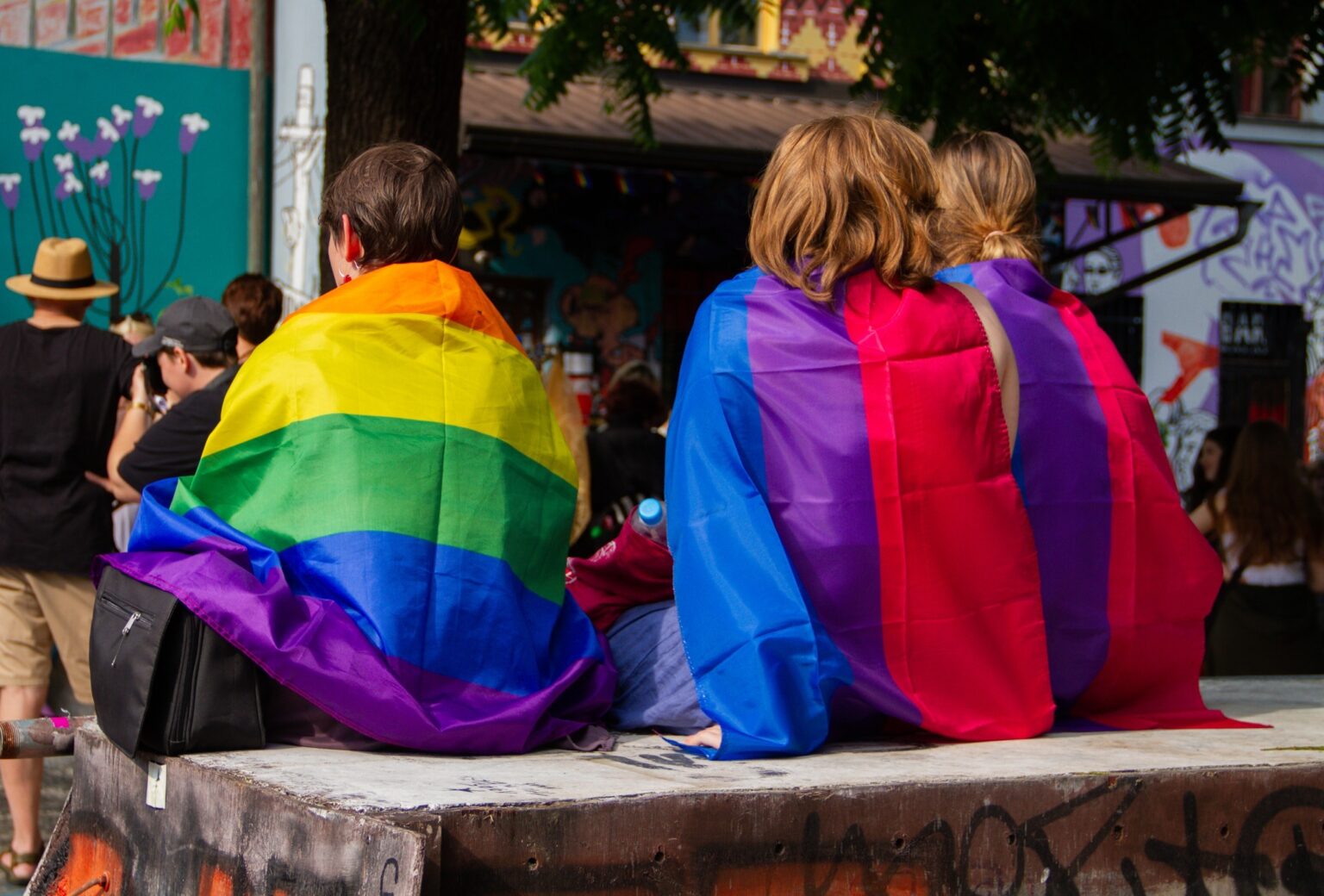
A far-reaching new survey into bi+ groups in Europe and their work, shows glaring gaps and points the way forward for a movement that’s often sidelined in the broader LGBTI movement.
Bi+ activism in Europe has been evolving, but until recently, there was no structured way to understand the needs, challenges, and opportunities facing bi+ groups. New research offers the most comprehensive look yet at the bi+ movement across the continent.
The survey, conducted by Bi+ Equal, gathered input from 39 bi+ groups and 44 individual activists from nearly every EU country. It reveals a dynamic but underfunded and underrepresented movement. The findings show that despite bi+ people being the largest group under the LGBTI umbrella, they remain largely invisible, often sidelined in broader LGBTI spaces and political advocacy.
The research report highlights that bi+ groups and activists prioritise three main goals:
- Promoting bi+ visibility and inclusion in LGBTI communities (83%)
- Challenging bi+ erasure and negativity (79%)
- Creating positive, healthy, and safe communities for bi+ people (67%)
A significant takeaway is that bi+ people still struggle for recognition, even within the LGBTI movement. Many organisations fail to acknowledge the specific needs of bi+ people, contributing to a sense of isolation. The findings recommend that LGBTI organisations take active steps to educate themselves on bi+ experiences, address bi+ erasure, and ensure their work is inclusive of bi+ people.
Stark Disparity
The survey also confirms a stark financial disparity between bi+ groups and other LGBTI organisations. While 76% of bi+ groups operate on less than €5,000 annually, LGBTI organisations generally have much larger budgets, making it difficult for bi+ activists to sustain their work. Many groups rely entirely on volunteers, leading to burnout and stagnation. “About half of the active bi+ groups do not have any budget. And the difference with LGBTI organisations in Europe is huge,” Dr Jantine van Lisdonk said during a panel where Bi+ Equal research team discussed the outcomes of the survey.
This financial struggle means that while bi+ groups excel in community-building like organising meetups, support groups, and social events, few have the resources to engage in formal advocacy. “There is a growing need for political advocacy for bi+ issues, but the financial resources are limiting this” shared Aida Marukyan during the panel. Despite widespread recognition that bi+ people need targeted policies and representation, only a handful of bi+ groups engage directly with policymakers or push for systemic change.
Striking finding
One of the most striking findings is the strong support for a formal European bi+ entity. The survey found that bi+ activists envision such an organisation as a platform for networking, advocacy, and capacity-building. It could help address the lack of funding, provide political representation, and foster cross-border collaboration. The Bi+ Equal survey has provided insight into the state of bi+ activism in Europe. It confirms what bi+ activists have long argued: that their visibility and advocacy need to be strengthened, that funding disparities must be addressed, and that the movement requires an organised European voice. Bi+ Equal is committed to taking the next steps, working with activists to co-create a structure that meets their needs. The research is a first step in ensuring that bi+ voices are no longer ignored but instead positioned at the centre of LGBTI equality work in Europe.
Meeting the realities faced by racialised LGBTI asylum seekers
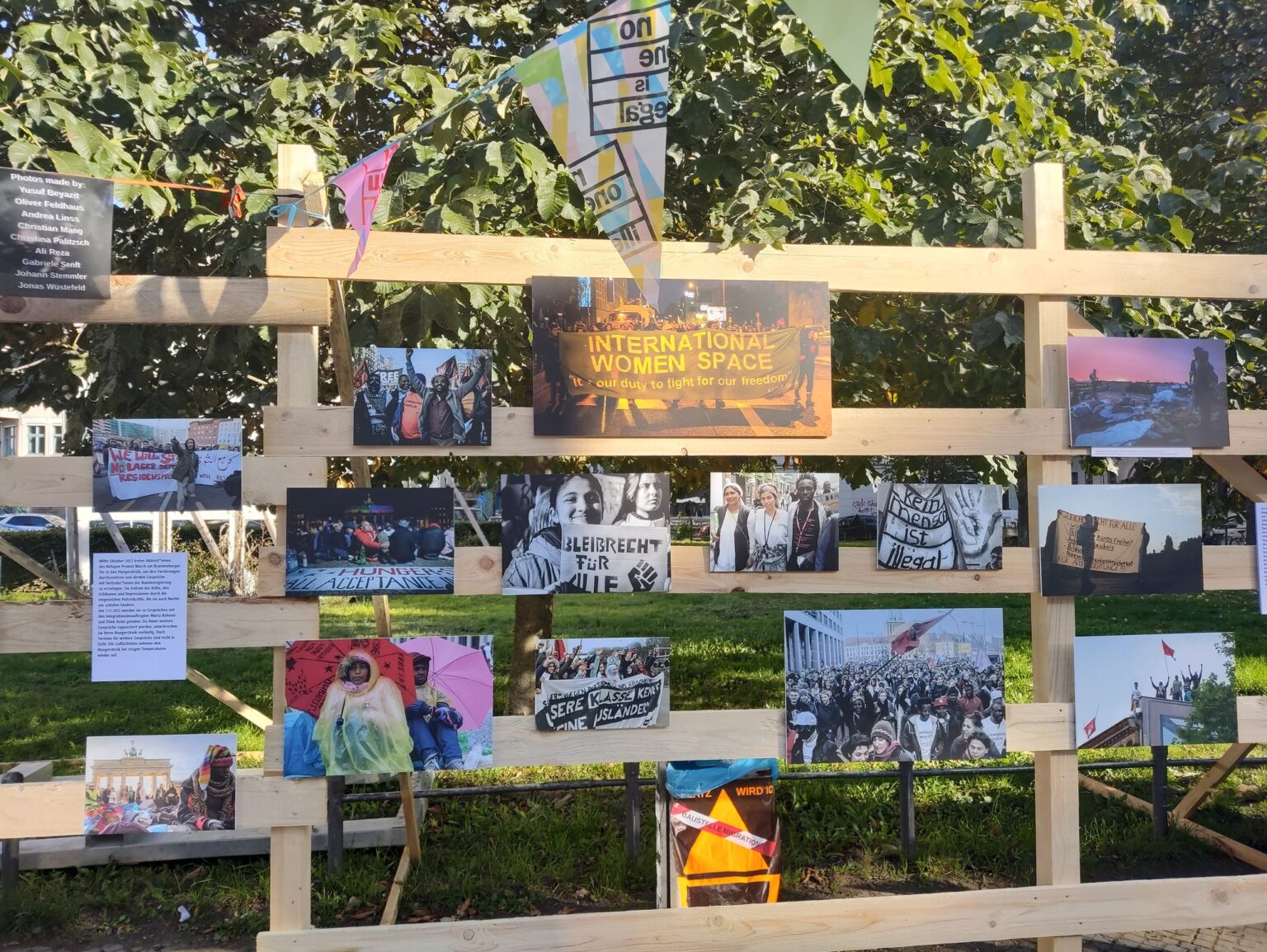
In the first of a new series of blogs, highlighting the work of LGBT organisations tackling injustice, racism, and discrimination, we explore how The Break Isolation Group in germany supports racialised LGBTI asylum seekers.
“No one can tell you better how to navigate the system than someone who has lived through it. We’re tired of people deciding for us or speaking on our behalf.“
In this series, we’re sharing insights from work done by LGBTI organisations who address intersectional impacts of injustice, racialisation, racism and supremacy, and specific harms affecting the lives of racialised LGBTI communities across Europe. We hope their stories and practices will inspire and resonate across communities. We believe that solutions and approaches that include a few will pave the way and point to the solutions for many.
The Break Isolation Group, part of the International Women* Space (IWS), provides a compelling example of how grassroots, refugee-led initiatives can address the systemic isolation and oppression faced by asylum seekers in Germany. The group operates alongside Resilient Voices, a working group focusing specifically on the needs of queer refugees. Together, they tackle the overlapping and distinct challenges faced by marginalised communities in the asylum process.
Understanding the system: isolation as policy
The asylum system in Germany like in many other countries across Europe, as described by Ann, a member of IWS, “thrives on isolation.” Refugees are often placed in remote, restrictive accommodation centres, known as lagers1, which are specifically designed to curtail mobility and exacerbate social exclusion. Ann reflects on the systemic dehumanisation inherent in this setup: “The system seems to want us to be content with the bare minimum, to accept being treated as less than human.”
For queer asylum seekers, the challenges multiply. Ann highlights that the asylum process burdens LGBTI people with proving their sexuality in invasive and humiliating ways: “Just saying you identify as queer isn’t enough—you’re expected to provide proof, though no one tells you what that proof looks like.” Shared accommodations expose them to further risks. Rose, another member of IWS, points out, “Homophobia doesn’t disappear when people leave their countries. You’re often housed with people from the same communities, who perpetuate the same biases and violence.”
Peer-to-peer support as a cornerstone of resilience
Against this backdrop, Break Isolation Group has built its work on peer-to-peer support. Ann emphasises the approach’s significance: “No one can tell you better how to navigate the system than someone who has lived through it. We’re tired of people deciding for us or speaking on our behalf.”
Their monthly visits to lagers allow them to connect directly with asylum seekers, but discretion is key to ensuring safety. “We don’t loudly announce that we’re queer representatives,” Rose explains. “Instead, we create safe ways for people to connect with us—through WhatsApp groups or anonymous info lines funded by collaborators.”
These efforts help asylum seekers feel less isolated in a system designed to isolate. “Sometimes, just seeing a familiar face—someone who looks like you and has been through the same thing—can be transformative,” says Ann.
Bridging isolation through community building
Break Isolation Group also focuses on fostering community. Their strategies range from storytelling and shared meals to more structured activities like legal workshops. Rose shares an example: “The Ubuntu Kitchen brings women together to cook and share meals. Food is a powerful way to build trust and connection.”
Annual retreats offer a space for asylum seekers to step away from the daily struggles of the asylum system. These events combine moments of rest and healing with workshops and advocacy training, helping participants recharge and develop skills for navigating the system and organising collectively.
From survival to advocacy
While much of their work addresses immediate needs, Break Isolation Group also aims to challenge the systemic structures perpetuating these challenges. They advocate for the abolition of lagers, the right to work and study, and freedom of movement. “The asylum system isn’t designed to support us—it’s a hotbed of oppression,” Ann explains. “We need to dismantle these systems and replace them with ones that prioritise dignity and autonomy.”
The group is also campaigning against the introduction of payment cards (Bezahlkarte) for asylum seekers, a measure resulting from the revision of the Asylum Seekers’ Benefits Act. These cards limit and control how asylum seekers can spend their financial support, preventing them from withdrawing cash and restricting where and on what they can spend money. “This system dehumanises us by taking away our ability to make basic choices,” Rose says. “It’s a regression to policies that were already deemed harmful a decade ago, when a similar system of vouchers was in place.”
Another critical area of their advocacy is recognising climate refugees. Rose highlights the gap in current asylum frameworks: “The system only seems to understand migration as a result of war, but climate change is forcing millions to move, and we need policies that acknowledge that.”
Lessons for the wider movement
Break Isolation Group is a grassroots, refugee-led initiative that addresses systemic injustice. Their work demonstrates that those most affected by these systems are best placed to identify solutions and changes that need to come about. As Ann says, “We are not just survivors of these systems—we are experts in how to dismantle them.”
Group’s focus on peer-to-peer support and community-building, the intrinsic intersectionality of their work and the bedrock of their advocacy efforts being around basic human rights provide valuable insights for broader movements. “When we focus on the most marginalised, we create solutions that benefit everyone,” Rose asserts.
The group’s work challenges us to ask: how can we listen to and amplify the voices of those most affected? How can we build movements that prioritise both immediate care and long-term transformation? Where our work could lead us when we put basic human rights, like freedom of movement, or intersectionality, like racial and climate justice, at its forefront?
New funding
ILGA-Europe continues its commitment to providing funds and support for this part of LGBTI movement that addresses intersectional impacts of injustice, racialisation, racism and supremacy. On 30 January 2025, we launched a new call for proposals to support European groups working for and with racialised LGBTI communities. This is the third cycle of this programme. Apply by 30 March 2025, 23.59 CET.
- Here and throughout the blog, we use “lager” as a reference to refugee accommodation centres. This term is strategically chosen by activists, including Break Isolation Group, to describe the isolating nature of these guarded buildings and complexes, which are typically located on the outskirts of towns, disconnected from communities, and impose curfews and visitor restrictions. Activists reject the official term “Heim” (a German word for home) because it sugarcoats the dehumanising character and historical context of this form of accommodation.
↩︎
The challenges and triumphs for the LGBTI movement in 2025
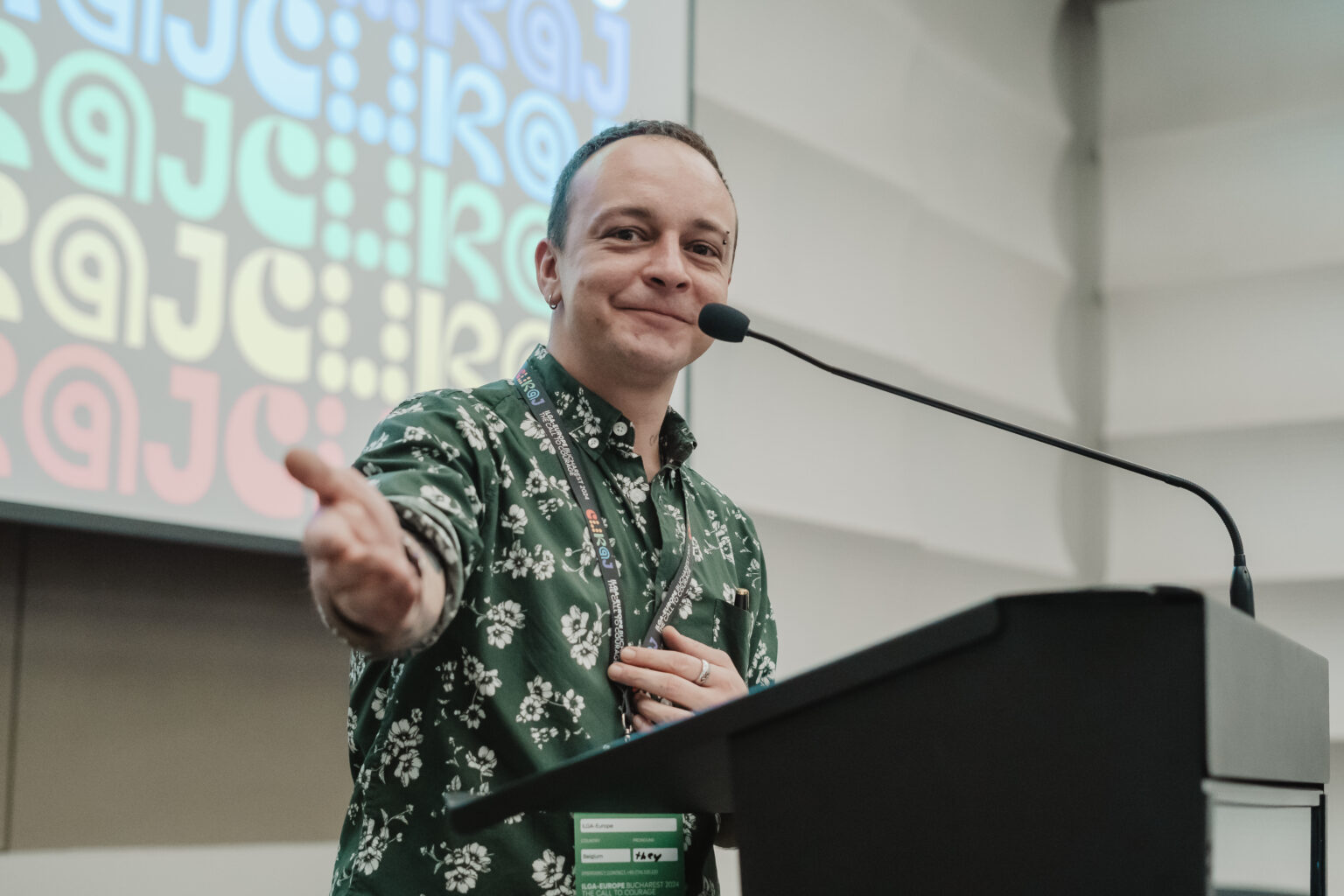
ILGA-Europe’s Executive Director Chaber shares insights into the movement’s direction, priorities, and how we can collectively move forward.
Q: Where do you see the LGBTI movement heading in 2025?
A: The past few years have shown how challenging these times are for the LGBTI movement, yet they’ve also revealed our community’s remarkable ability to adapt and persevere. We’re facing increased opposition, attacks on rights, and instrumentalisation in politics. However, there is hope in how the movement builds alliances—both within and beyond—and its capacity to engage underrepresented communities.
Many organisations are working tirelessly to shift societal attitudes and foster meaningful connections. These efforts to unite and inspire, after years of disconnection caused by the pandemic and conflicts, are the triumphs we can expect this year.
Q: What do you think the movement needs to focus on in 2025?
A: From the vantage point of an organisation that serves the movement across 54 countries, the diversity of needs and priorities is vast, so we cannot list or prescribe what groups and organisations should focus on. The issues that are prioritised locally are prioritised because organisations on the ground know best how to reflect the needs of their communities. And each of them, regardless of whether they’re organising prides, supporting communities with services, advocating with their governments or doing any other thing, plays a crucial role in the ecosystem. But an interesting question is on the broader themes that many organisations wish they had more capacity to address. These include fostering intersectional approaches, engaging underrepresented communities, combating disinformation, and building alliances across movements.
This shows it’s vital to have dedicated, flexible funding to enable organisations to meet these challenges effectively. Unfortunately, resource cuts across the region make these goals harder to achieve, so increasing organisations’ abilities to adapt and deliver in these circumstances will be a key point for the year and beyond.
Q: What is ILGA-Europe’s role in achieving these goals?
A: ILGA-Europe plays three key roles:
- Resource mobilisation: With funding cuts from governments and private philanthropy, we must advocate for sustained investment in LGBTI movements.
- Agenda-setting: It’s crucial to influence institutions and governments to ensure policies address the needs of LGBTI communities and empower civil society.
- Thought leadership: We’re prioritising developing strategies and capacities in areas that have not had enough attention paid to them but will be core to enacting change in the future, such as social acceptance, socio-economic justice, and emerging fields like AI. Our role is to explore and provide tools for organisations to engage with these issues.
Q: What challenges does the movement face, and how can they be tackled?
A: Insufficient political will remains a significant barrier. Many governments believe they’ve already achieved enough in terms of LGBTI rights, while others are actively rolling back protections. Anti-rights initiatives, such as anti-LGBTI propaganda laws and restrictions on foreign-funded organisations, are spreading.
To counter these, we must galvanise political will and mobilise governments and institutions to stand against such measures. It’s equally vital to educate and engage the public, building comprehensive advocacy and alliance strategies.
Q: What policy trends concern you most for 2025?
A: We’re deeply concerned about continued rollbacks on trans and non-binary rights and the spread of anti-LGBTI propaganda laws. These measures often coincide with anti-democratic initiatives, such as targeting foreign-funded organisations under the guise of transparency.
Such trends stem from the manipulation of public opinion and polarisation. They require advocacy and public engagement to counter false narratives and safeguard democracy and human rights.
Q: Which partnerships are most critical for ILGA-Europe in 2025?
A: Attacks on LGBTI rights are not only about silencing LGBTI people, they are often part of broader efforts to undermine democracy and target other marginalised groups, such as women and migrants. Our partnerships must reflect that all of us are at risk, and continue extending beyond the LGBTI movement to include organisations representing the interests of other groups. What is at stake is democracy and the rule of law, and through that the freedoms of people.
Q: What is your personal goal as Executive Director for 2025?
A: My priority is to ensure ILGA-Europe becomes more agile and adaptable. With the funding cuts across the region we will not double our resources, but the needs will increase, and we must find ways to offer faster and more tailored support to diverse groups and organisations. It’s about staying ahead of the curve and continuing to serve the movement effectively.
Q: What is your message to the LGBTI community as we start the year?
A: In these challenging times, we need to redefine success and celebrate even the smallest wins. Every act of visibility, every partnership, and every step forward is a victory. Together, we’re part of a larger ecosystem of change.
Our work with activists to help build strong communications strategies
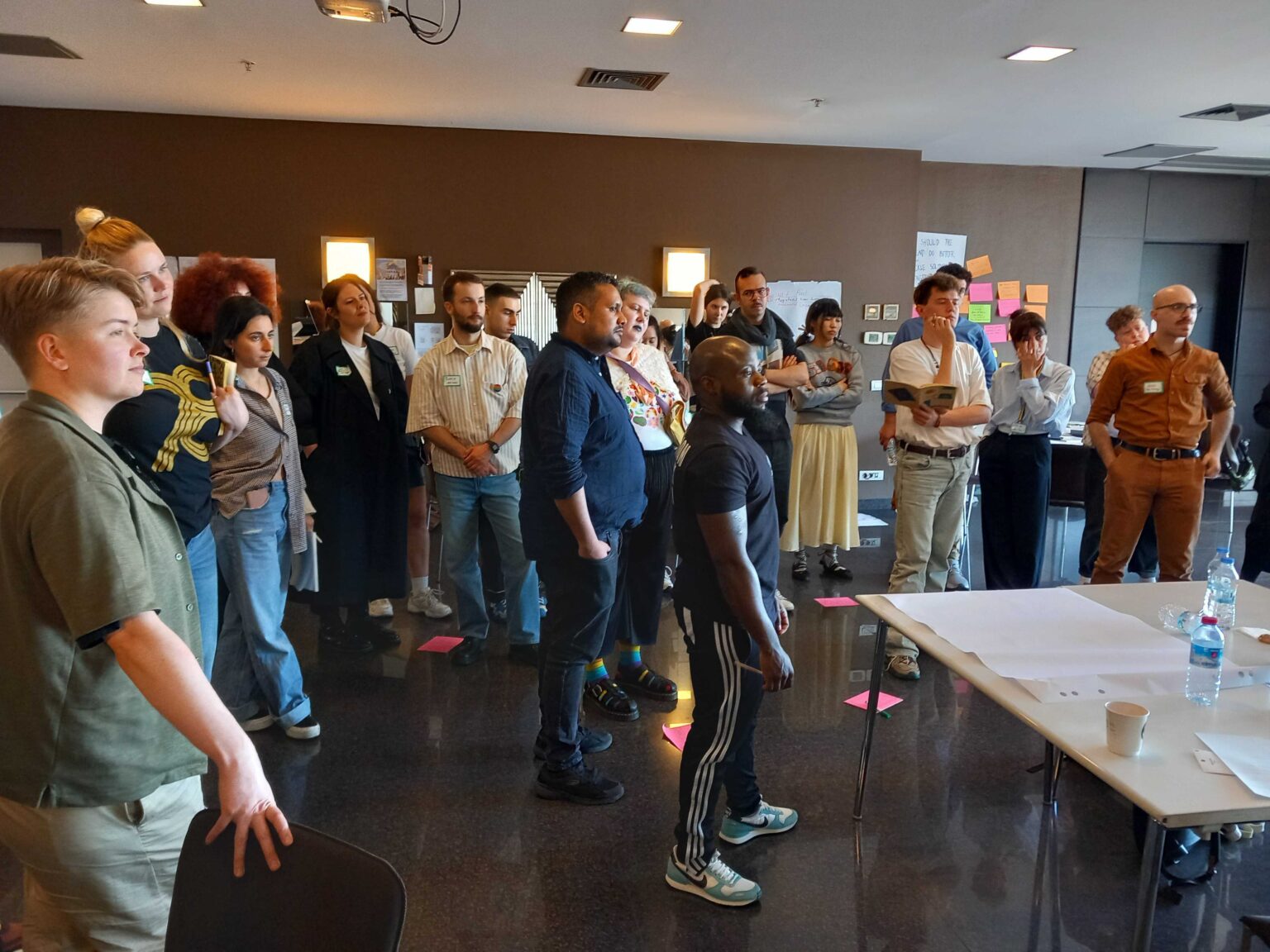
Over the past three years at ILGA-Europe we have been running a number of online Skills Boost sessions for activists who want to improve their communications skills. Recently we held two sessions on how to develop a communications strategy. Here’s what our participants learned.
During our recent online Skills Boost on communications strategies, we asked around 100 participants where they were within the cycle of a comms strategy creation. The majority of them responded with : “Thinking, but not started yet”.
Activists often face an overwhelming workload, and it can be difficult to prioritise something like a communications strategy amidst so many competing demands. Yet, having a strategy is not just another task; it is the foundation that makes all other communications more focused and effective.
Without a strategy, efforts can feel scattered or reactive, diminishing their impact. A good strategy ensures that your messaging reaches the right people, with the right message, at the right time. It is not about doing more but about working smarter and ensuring that your communications actively contribute to your organisation’s goals.
It may seem insurmountable, but it’s easy
Developing a communications strategy can feel like a big task, especially for LGBTI groups navigating limited resources and competing priorities. However, a well-thought-out strategy is more than a document—it is a tool that helps focus your efforts, align your team, and amplify your impact.
The good news is that you do not need a lengthy report or expensive consultancy to begin. What you really need are a few meaningful conversations with your team and a clear sense of where you’re heading. Here is an easy breakdown of the key elements of our Skills Boost to build a communications strategy:
Develop a four-question backbone
At its heart, a good communications strategy is about answering these four questions:
- Why? Why are we communicating? What impact are we aiming for?
- Who? Who do we need to engage, persuade, or mobilise?
- What? What stories, messages, or visuals will resonate?
- Where? Where can we best reach our audience?
These questions form the backbone of any effective strategy. By working through them together as a team, you’ll uncover what really matters and avoid getting caught up in endless, unfocused activity.
Skip the one-size-fits-all approach
Every organisation is unique, and a communications strategy should reflect this. Rather than following a generic template, craft a plan that considers your specific context, priorities, and resources.
Start by identifying what feels most urgent or significant to your team. Perhaps your focus is on strengthening advocacy, connecting more deeply with your community, or shifting public narratives. It is equally important to recognise that you do not have to tackle everything at once. Set priorities, focus on a few clear objectives, and treat your strategy as a living document that evolves with your organisation.
Fill the gaps in your current practices
A communications strategy should simplify your team’s work, not add unnecessary complexity. Think of it as a roadmap: a practical guide that clarifies your direction without overwhelming you with rigid rules.
Start by examining your current practices. What is working well? Where are the gaps? Use these insights to build a framework that streamlines your messaging, focuses your channels, and supports intentional conversations. When done well, a strategy provides clarity and confidence, making your communications more cohesive and impactful.
Begin with small steps
At its core, communications is about connection—and every connection starts with intention. Begin by gathering your team and discussing the four key questions. Even small steps can lead to significant clarity and progress.
If you need further guidance, explore ILGA-Europe’s resources on strategic communications on The Hub, ILGA-Europe’s LGBTI Resource-Sharing Centre, or reach out to us for tailored advice. Together, we can ensure your voice not only reaches the right audiences but makes a lasting impact.
How to win the fight against conversion practices in Europe
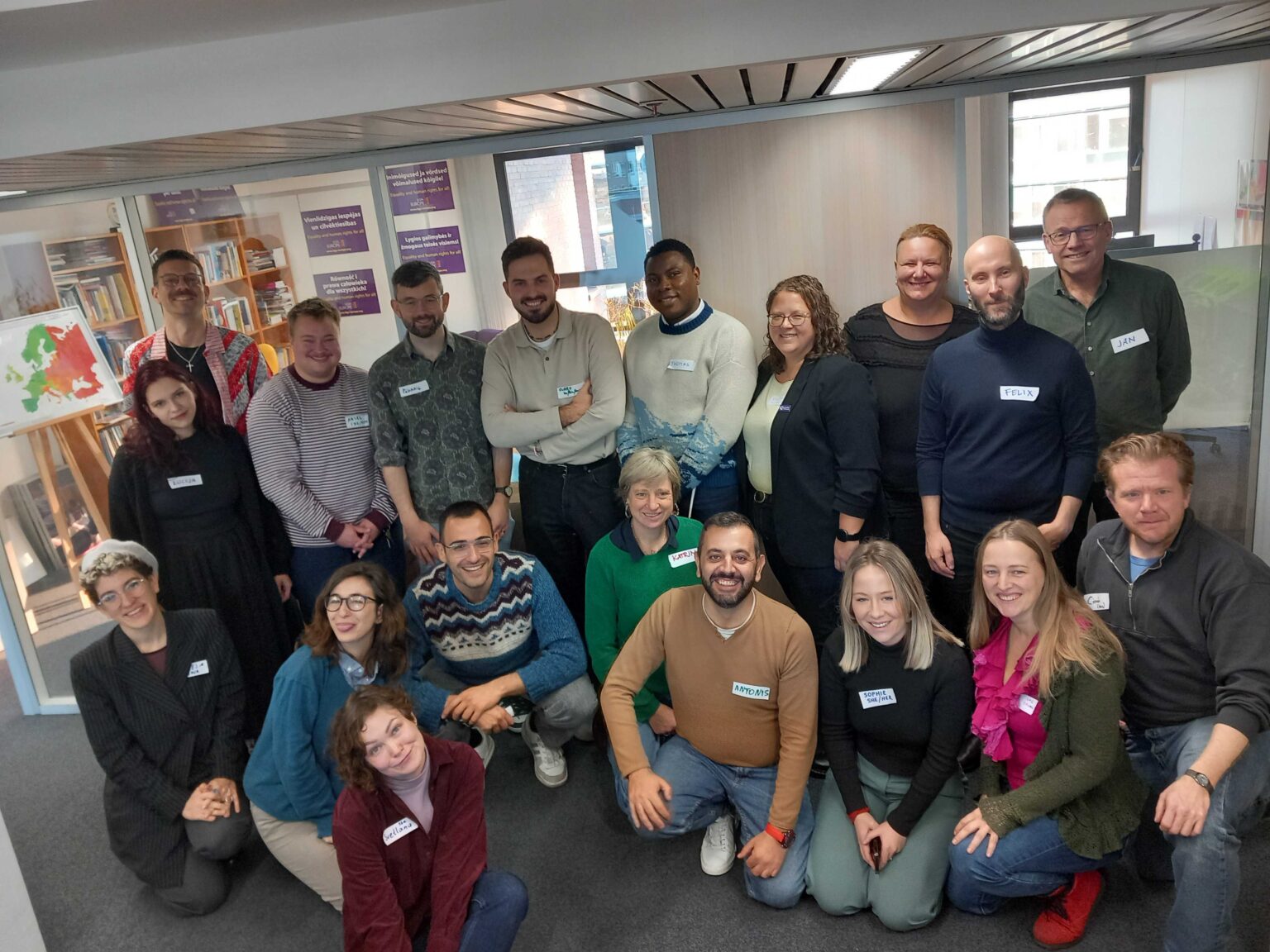
Activists across Europe are working to end conversion practices, but the insidious and underground methods out there of trying to change a person’s sexual orientation or gender identity make for a battle against many odds.
At the ILGA-Europe offices we recently hosted a meeting with activists from different parts of Europe to discuss the way forward for working to end conversion practices. For this blog, we sat down with some of them to discuss the complexities involved.
One of the key messages that emerged from the discussion was the need to expand the public’s understanding of conversion practices. While many still associate these practices with extreme forms of torture – such as electroshock therapy – the reality is more subtle. Conversion practices often take covert forms that still cause significant harm.
“Conversion practices might not always look like torture, but the effect of them is the same,” Erin Lux from Equality Scotland explained. “It is a process of trying to change or suppress who a person fundamentally is.” Curro Peña Díaz from No Es Terapia added, “What we think of as conversion practices – violent therapies – are often much more subtle and insidious. They can appear helpful, but they’re actually harmful.”
The covert nature of these practices makes them difficult to identify and combat. As Parvy Palmou from The Greek Transgender Support Association pointed out, “Most conversion practices are done behind closed doors, making them hard to prove.” Thomas Ologo from Inter-LGBT in France echoed this, noting that many conversion therapies have gone underground. He also emphasised the need for continued education, saying, “We need to ensure that people – especially professionals – understand the nuances of conversion practices so they can help prevent them.”
This shows the importance of shifting the conversation to understand that conversion practices are still widespread.
Do conversion practice bans work?
Many activists agree that while a ban on conversion practices is a necessary starting point, it is not enough. In countries where bans exist, these practices still occur underground. Aksel Emil Houmann from LGBT+ Denmark said, “A ban is not enough. We need to change the belief that queer people are broken.”
Parvy Palmou also pointed out the limitation of bans, particularly in Greece, where conversion practices are banned for minors but not for adults because adults have the capacity to provide consent. “Can someone truly consent to the torture of their own identity?” she questioned.
“By collaborating with other groups, like children’s or women’s organisations, we become stronger and more effective.”
Askel Emil Houmann, LGBT+ Denmark
For bans to be effective, they need enforcement, public awareness, and comprehensive support systems. Erin stressed: “We need to raise awareness so people understand that conversion practices are still happening and that we can stop them through both legislation and support services.”
Activists also highlight the importance of working with a broad coalition of allies. Aksel added, “By collaborating with other groups, like children’s or women’s organisations, we become stronger and more effective.”
Not simply passing laws
Alongside legal measures, activists emphasise the need to protect victims and change public attitudes. According to Curro Peña Díaz: “We need protective measures to empower victims and help them escape these harmful practices.”
Rosario Coco from Gaynet in Italy highlighted the importance of education: “We need to reach all stakeholders – mental health professionals, human rights organisations – because conversion practices involve many actors.”
Ultimately, the fight is not just about passing laws, but about shifting societal attitudes. Rosario pointed out, “A ban is crucial, but we must also move public opinion, influence institutions, and educate civil society.”
The fight to end conversion practices is complex but not impossible. Activists across Europe are leading the charge, with strategies that include raising awareness, enforcing legislation, building coalitions, and changing public perceptions. As Curro Peña Díaz summed up: “We need to ensure people know conversion therapy is still happening and that it’s extremely harmful.”
LGBTI rights are human rights
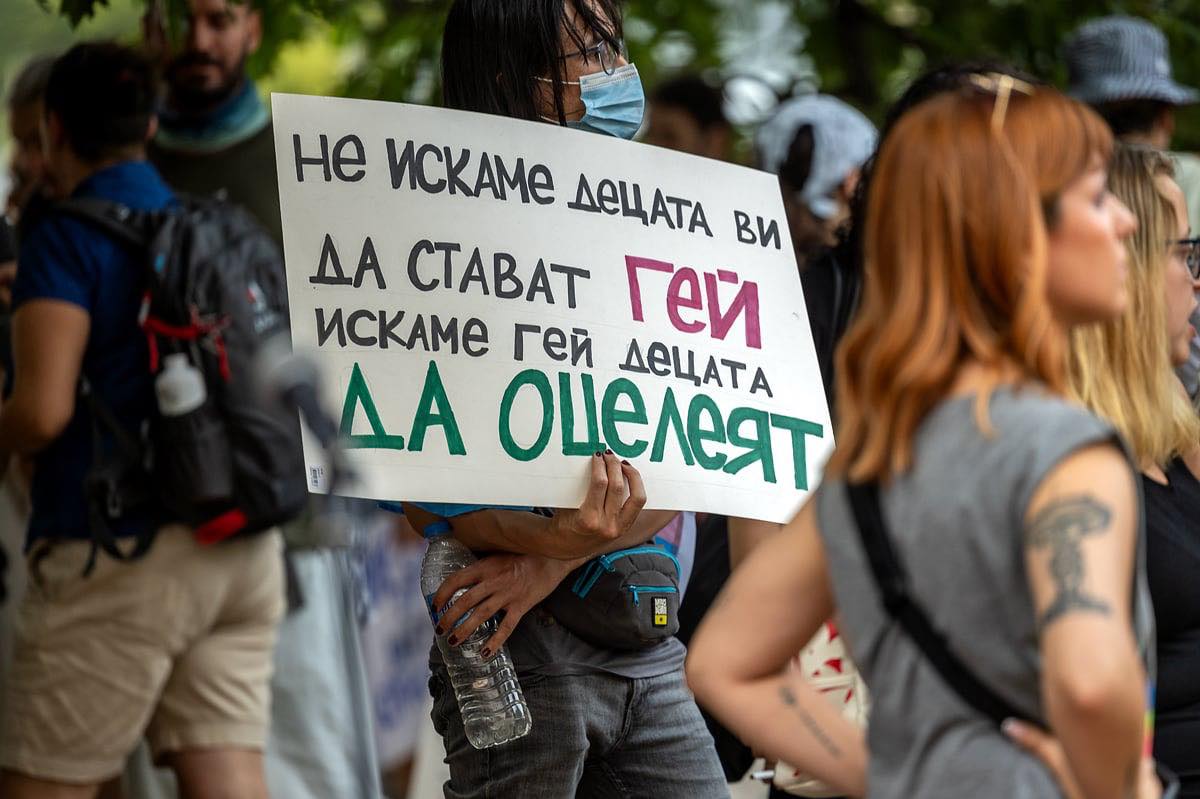
On Human Rights Day we reflect on struggles and milestones for the European and Central Asian LGBTI movement in 2024.
Human Rights Day reminds us of the universality of human rights: freedoms that belong to all people, no matter their identity. This principle is at the heart of the LGBTI movement, as LGBTI rights are human rights. In 2024, these rights were both challenged and celebrated, often reflecting broader societal shifts.
Across Europe and beyond, anti-LGBTI measures highlighted the fragility of hard-won freedoms. Georgia adopted both a “foreign agent” law and an “anti-LGBTI propaganda” law, echoing a troubling global trend of restricting civil society and stifling dissent. On December 2nd, the restrictive law came into force, banning legal gender recognition and equating same-sex relationships with incest, further institutionalising discrimination against LGBTI communities. The law also declared May 17 a holiday opposing the International Day against Homophobia, Transphobia, and Biphobia, amplifying the state’s anti-LGBTI stance. Bulgaria introduced laws targeting the discussion of LGBTI issues in schools, marking another attack on both education and freedom of expression. In Russia, the international LGBTI movement was branded as “extremist” in late 2023, but 2024 saw the first convictions under this extremist label, intensifying the risks for activists and organisations. Kyrgyzstan followed suit by enacting a Russian-style “foreign agents” law in April, subjecting non-profits to extensive state oversight and jeopardising the work of press freedom groups and civil society, including LGBTI organisations.
These developments show how attacks on LGBTI rights often signal deeper human rights violations. In Turkey, trans rights faced severe setbacks with new regulations restricting access to essential hormones, disproportionately affecting trans masculine people and those in poverty. Police repression of LGBTI demonstrations further highlighted the shrinking space for activism and public dissent. The suppression of freedom of speech, association, and democratic principles often accompanies discrimination against LGBTI communities. As such, defending LGBTI rights is part of defending the foundations of democracy and equality for all.
Progress, despite setbacks
Despite these setbacks, 2024 was also a year of hope and progress. Germany’s adoption of a self-determination law marked a major step forward for trans and non-binary people, simplifying legal gender recognition. Greece joined the growing list of European countries recognising equal marriage, while Malta’s introduction of non-binary markers on official documents underscored its commitment to inclusivity.
Beyond Europe, global human rights institutions also made strides for LGBTI people. The UN Human Rights Council adopted a resolution affirming the rights of intersex people, a relevant step in recognising and addressing the unique challenges they face. The European Court of Human Rights ruled that Poland must provide legal recognition for same-sex couples, and the Court of Justice of the European Union declared that Romania must respect gender recognition granted in other countries.
Ensuring no one is left behind
These moments of progress illustrate that advancing LGBTI rights benefits societies as a whole. Laws that affirm equality and dignity strengthen the social fabric, ensuring that no one is left behind. This year’s developments—both the setbacks and the victories—show that progress is possible, but it requires vigilance, solidarity, and collective action.
In February 2025, ILGA-Europe will publish its Annual Review, documenting these and other critical moments from the past year. Stay tuned!
World Aids Day 2024: Making a world where HIV is history
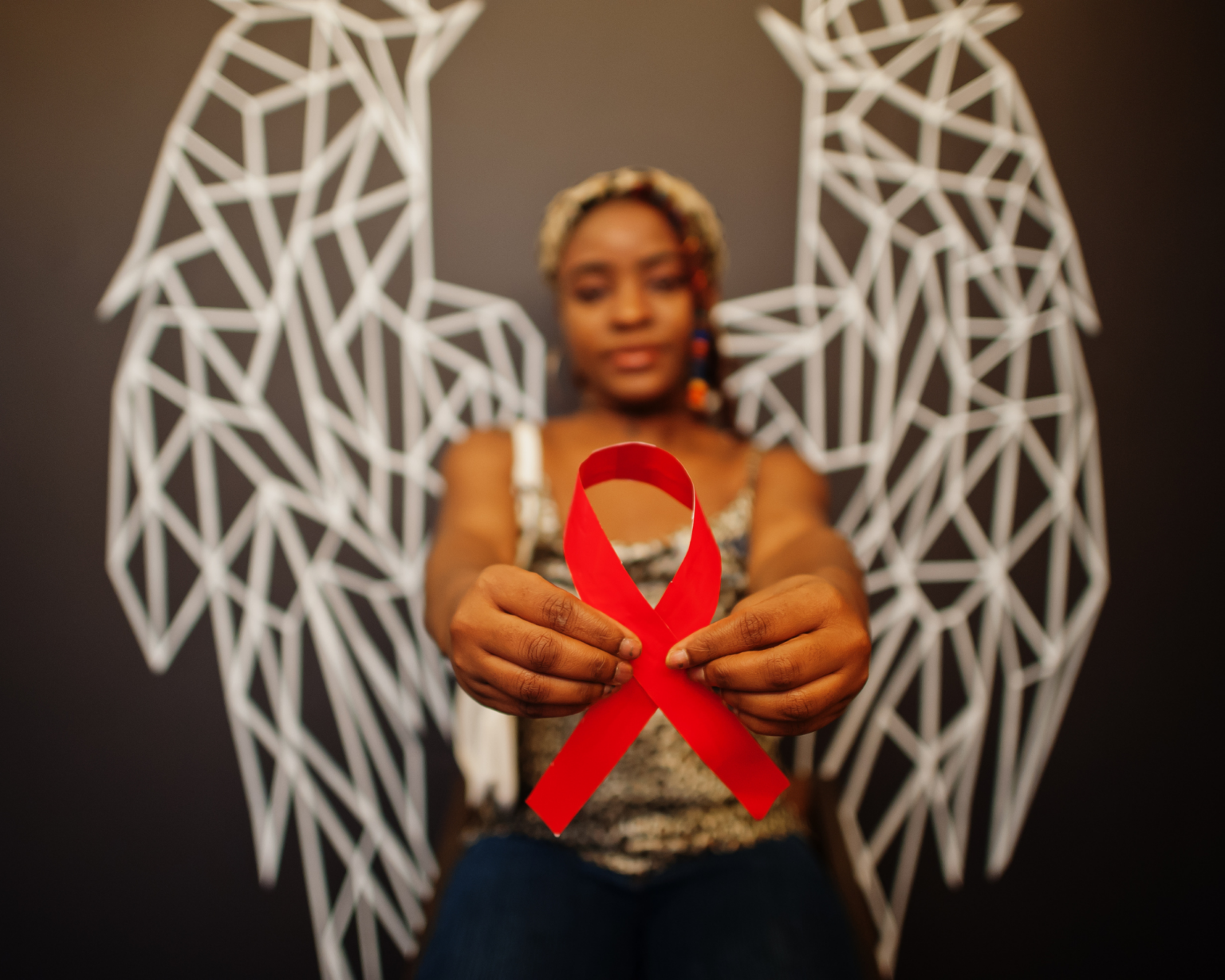
Although it seems a long way off, HIV activists believe that consigning HIV and AIDS to history is an achievable goal. This World AIDS Day, we explore how that goal might become a reality.
World AIDS Day is an opportunity to reflect on the progress made in the fight against HIV, honour those we’ve lost, and recommit to creating a world where HIV is no longer a source of stigma, discrimination, or inequality.
As Paul Wickson, a queer activist from the UK, shares in his powerful statement:
“I lived through the HIV and AIDS crisis of the 80s and 90s. I lost friends to the disease, like so many millions of others… I want to see a world where HIV is history.”
HIV activism, like Paul’s, has brought us closer to that vision, but much work remains. Today, with advances like Undetectable = Untransmittable (U=U) and PrEP, people living with HIV can lead healthy, fulfilling lives. Yet, stigma and barriers to accessing testing and treatment persist, disproportionately affecting LGBTI communities, particularly men who have sex with men and trans people.
The importance of knowing your status
The 2023 FRA LGBTIQ III Survey introduced critical data on HIV testing, shedding light on disparities across sexual orientation, gender identity, and countries. Testing is a key step in ensuring early diagnosis and accessing treatment, yet the numbers reveal stark inequities:
- 47% of cis gay men had an HIV test in the past year, with peaks of 57% in Belgium.
- Among trans women, 43% reported testing, with rates as high as 57% in Cyprus.
- However, only 25% of gay trans men had tested in the last year, dropping to a concerning 2% in Hungary.
These figures show the urgent need for inclusive public health strategies and targeted funding programmes that dismantle barriers and encourage people across all LGBTI groups to access prevention, testing and treatment.
Breaking stigma, saving lives
Stigma and misinformation remain among the most significant challenges in addressing HIV. They discourage testing, silence conversations, and perpetuate discrimination. Yet, as Paul reminds us, activism rooted in personal experiences has the power to transform the narrative:
“I became a queer activist in large part because of my HIV status… I want to see a world ideally where HIV is history. We aren’t there yet, but I have confidence… that is an achievable goal.”
This World AIDS Day, let’s commit to empowering our communities with information, normalising discussions about HIV, and advocating for accessible, inclusive healthcare. Testing is not just a personal choice—it’s a collective step toward dismantling stigma and saving lives.
Take action
- Be informed: Know your status and encourage others to do the same.
- Be vocal: Challenge stigma and misinformation around HIV.
- Be engaged: Support LGBTI organisations advocating for HIV prevention and care.
Together, we can build a future where HIV is no longer a source of inequality but a chapter in history.
Seeking justice and dignity for Uzbekistan’s LBQT women

Highlighting the hidden struggles of LBQT women in Uzbekistan amid calls for decriminalisation
Trigger warning: This story includes descriptions of torture and violence.
As the global community marks the 16 Days of Activism against Gender-Based Violence, the hidden struggles of LBQT women in Uzbekistan bring forward urgent calls for decriminalisation and systemic change. Uzbek activists, working tirelessly to amplify these voices, underscore that criminalisation of LGBT identities and strict patriarchal norms create conditions of unchecked violence and discrimination for lesbian, bisexual, and transgender women, who face isolation and danger within their own communities and families.
Among these stories of courage is that of Dinora (name changed), a transgender woman who has endured years of persecution and hardship. Detained under Article 120—a law criminalising “sodomy”—Dinora was tortured for simply living authentically. Her experience reflects the resilience demanded of Uzbekistan’s LBQT women. Despite her trauma, Dinora continues to advocate quietly, offering support to others in need.
Similarly, Gulnora, Zilola, and Manzura (names changed) navigate a society that views their identities as threats to family honour. Gulnora faced intense guilt and rejection, trapped between her true self and the societal expectations forced upon her by her family. Zilola, caught expressing affection for another woman, was forced into marriage and subjected to humiliating rituals to “cure” her. Manzura, who found some support within a loving relationship, still faces violent consequences from family members whenever her sexual orientation is revealed. Their lives embody the immense toll of societal and familial pressures, yet each woman has found ways to stand strong in the face of ongoing abuse.
Culture of impunity
The criminalisation of same-sex relations among men promotes a culture of impunity, embedding harmful stereotypes that target all LGBTI people. For LBQT women, especially, rigid gender expectations amplify their suffering, leaving them trapped between cultural norms and a legal system offering no recourse or protection. These women’s stories illustrate not only the isolation they face but also the extraordinary courage required to pursue dignity and self-acceptance.
As we share these voices during the 16 Days of Activism, we are reminded that the fight against gender-based violence must be inclusive of all women, regardless of sexual orientation or gender identity. Real justice and dignity for LBQT women in Uzbekistan demand urgent legal reform: the decriminalisation of same-sex relationships and protections for sexual orientation and gender identity within domestic violence laws.
For Dinora, Gulnora, Zilola, Manzura, and countless others, we must continue to call for a world where they can live freely and safely, without fear of persecution. Their courage in sharing these stories is a testament to resilience—a resilience that we hope will inspire lasting change.
For more on the experiences of LGBT people in Uzbekistan and the urgent call for decriminalisation, read the full report in English.
Answering the call to courage: What happened at the 2024 ILGA-Europe Conference
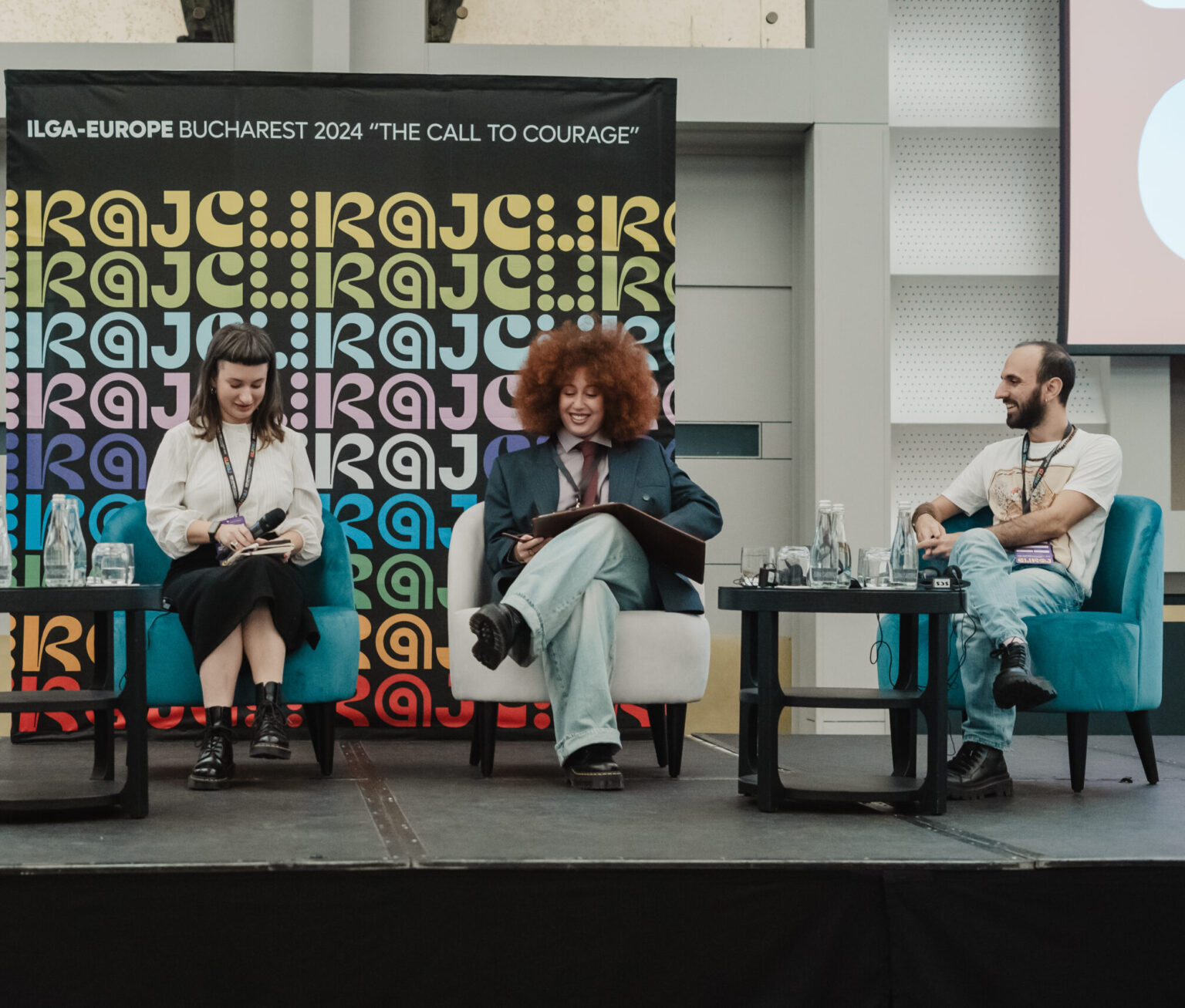
At this year’s ILGA-Europe Annual Conference in Romania, we had three dedicated activist reporters attending sessions across the event, so they could reflect on what was happening right now for the LGBTI movement in Europe and Central Asia. Here is what they found.
The 26th ILGA-Europe Conference, held in Bucharest this October, was a vital meeting ground for activists, leaders, and changemakers from across the LGBTI community, at this particular time in our world. Beyond its extensive sessions and networking opportunities under the theme, The Call to Courage, this year’s event featured the reintroduction of conference reporters—three dedicated activist voices tasked with connecting the threads of reflection, insight, and shared experience throughout the event. These reporters, Rina Rybalko from Ukraine’s Gender Stream, Sarah Arsane of Pride des Banlieues in France, and Andrea Ruggeri from Italy’s Gruppo Trans, shared their expectations, reflections, and key takeaways over the course of the packed three days.
Hope and expectation
Rina approached the conference with hope, acknowledging the uncertainties facing activists but focusing on the potential for solutions. “Since this is my second time at the conference, I know that we will talk about challenges a lot,” she shared. “And I hope that in these discussions we will find together decisions and solutions that we will bring back home to our communities.” This outlook was a testament to the resilience that Ukrainian activists have shown, especially amidst Russia’s ongoing full-scale invasion and its impact on LGBTI communities.
As the conference began, Sarah expressed excitement at the rare opportunity to connect with likeminded people. “I’m really looking forward to meeting LGBTQ+ activists from all over the world and hearing the unique stories and struggles,” she said. Her anticipation highlighted the conference’s role as a space for exchange, learning, and mutual empowerment.
Andrea, acknowledging both the gravity of their work and the community’s strength, spoke with poignant honesty. “Yesterday was not a good day for my country,” they remarked, referring to a newly passed law in Italy that criminalises seeking surrogacy abroad, a move that threatens LGBTI families and sets a concerning precedent. This difficult reality highlighted their hope to find emotional and political support while drawing strength from shared experiences.
Reflections during the conference
As the conference unfolded, each reporter shared insights into their evolving experiences. For Sarah, moments of connection stood out. Reflecting on the importance of unity and exploring vulnerabilities to promote growth, she said, “I particularly enjoyed the discussions on the various issues facing our communities. Being a Muslim woman, a racialised lesbian, and from working-class neighbourhoods, this particularly moved me.”
Rina was moved by the power of collective communication. “The highlight for me was communication—panel discussions, workshops, and networking, which was meaningful, fruitful, and sometimes challenging,” she noted. This understanding emphasised the importance of shared spaces where LGBTI voices can overcome barriers, address urgent needs, and build alliances.
Andrea’s reflections captured the diverse and layered nature of the Conference. “In one room, people are getting pragmatic by discussing how to tackle disinformation campaigns; in another, others are sharing how resilience keeps them grounded,” they observed. This collection of experiences showed how different strategies and discussions come together to strengthen our shared determination.
Courage as a takeaway
As the conference drew to a close, the atmosphere was charged with renewed determination. Rina spoke of courage as a verb: “It means to act, even when we are in a state of maximum uncertainty, for your own sake, for the sake of others.” She left the conference inspired by the dedication of fellow activists and motivated by the focus on meaningful change.
Sarah, in her closing words, summed up the spirit of solidarity at the Conference and within the movement. “What I take away is the strength of our community and the power of alliance… even in difficult times, we are stronger together,” she affirmed. Her speech served as a reminder that collective resilience, empathy, and unity are vital for progress.
Andrea concluded by highlighting a lesson learned year after year: “Queer people are taking care of themselves and teaching others how to take care of their communities.” This ongoing truth showed the depth of support and self-sustainability within the LGBTI movement, despite outside challenges.
A unified future
The conference reporters’ voices were a strong reminder that, while activists in our LGBTI movement may come from different contexts, the shared fight for dignity, safety, and rights binds them together. As they return to their home countries from this year’s Conference—whether grappling with legislative struggles, seeking innovative advocacy strategies, or rebuilding communities torn by war—they carry with them the shared knowledge, strength, and hope forged in Bucharest.
The ILGA-Europe Annual Conference 2024 in Pictures
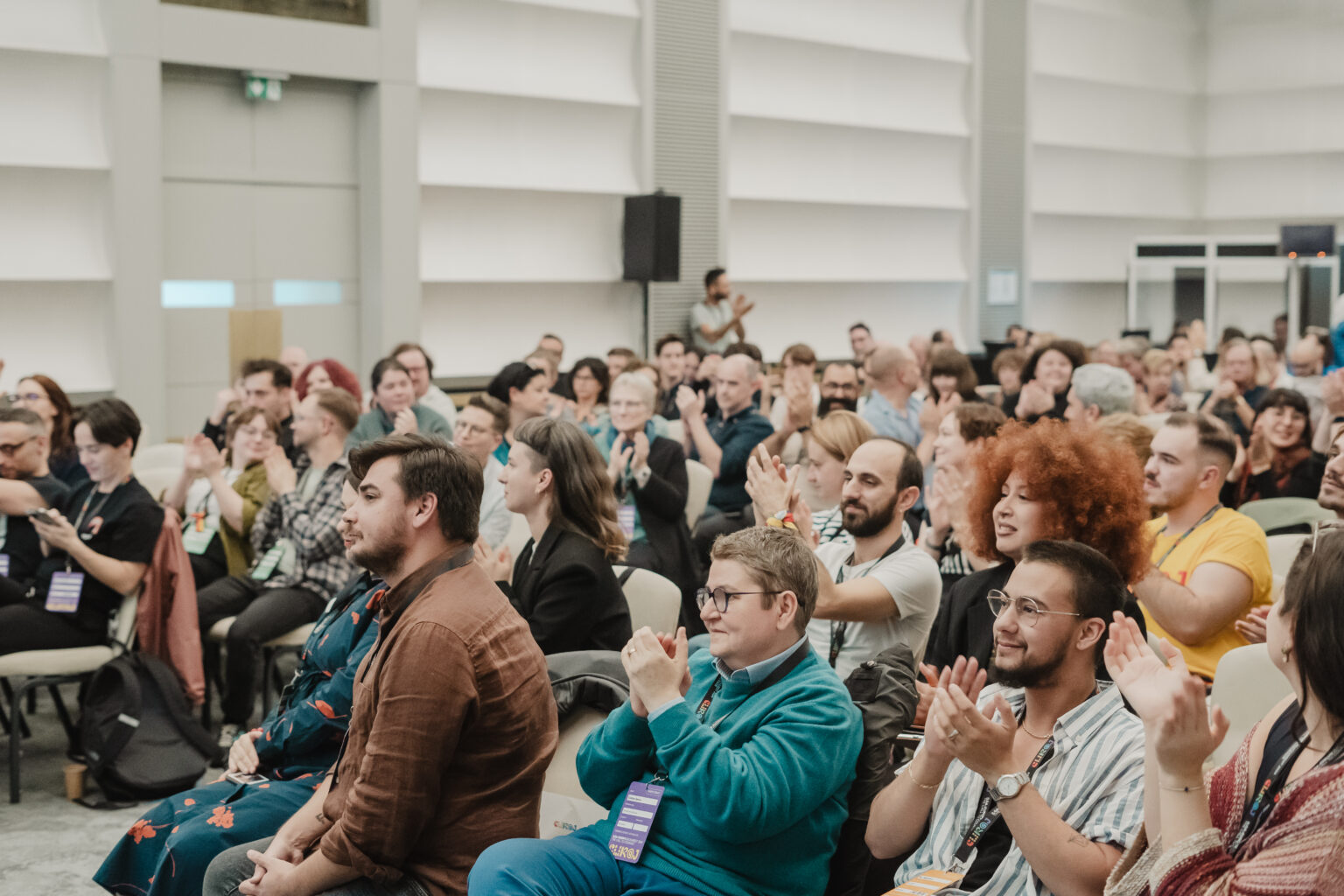
For four days in Bucharest, our photographer was there to capture every memorable moment of this year’s Annual Conference. Here are the highlights!
This October, we came together in Bucharest with over 400 LGBTI activists and allies from across Europe and Central Asia for ILGA-Europe’s Annual Conference. And what a journey it was! Four inspiring days filled with connection, sharing, strategising, and bolstering resilience for the challenges that lie ahead, all within an atmosphere of support and mutual empowerment. This year’s theme, The Call to Courage, rang through each panel, workshop, and conversation as we tackled pressing issues and explored new ways forward. And, of course, there were moments of celebration too, including a night Karaoke and a closing celebration with drag performances paired with local DJs.
Our heartfelt thanks go to our wonderful hosts, ACCEPT and MozaiQ, and to our talented photographer Larisa Balta, who captured the spirit of the conference. Here, we share a snapshot of those unforgettable days!
For a much larger selection of photos, be sure to check out our albums on Facebook.
ACCEPT – Strength in solidarity and a call for change
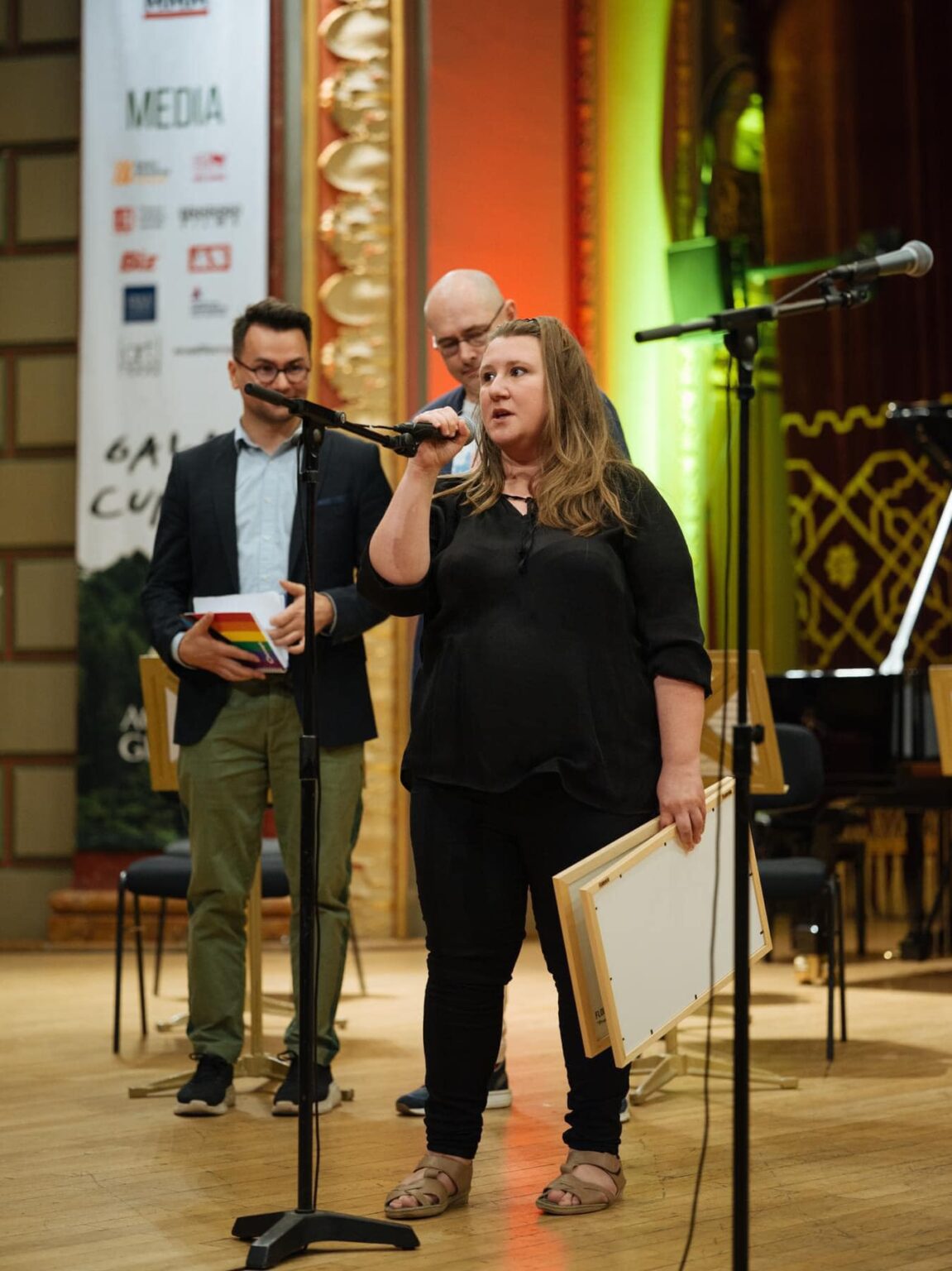
The Romanian LGBTI organisation, ACCEPT plays an important role in co-hosting the ILGA-Europe conference this year. Co-president Teo Ion-Rotaru shares her insights into what the Conference represents for the organisation and the LGBTI community in Romania, in light of the current political climate.
Hi Teo. Can you tell us what hosting the ILGA-Europe Annual Conference means for ACCEPT?
ACCEPT has been part of the European LGBTI movement for almost 30 years. Even though some faces have changed — staff, board members, and activists — our focus remains the same: growing and consolidating the movement. Hosting this conference offers a unique opportunity to contribute to the broader European movement, especially at a time when it is so needed.
It is a chance to bring together young and seasoned activists alike, offering a space where we can collectively reflect on our successes and challenges. My own first ILGA-Europe conference reinforced my belief in the power of community. Seeing others who had been through similar struggles, sharing strategies and support, was a powerful reminder that we are not alone.
What does this event mean in a wider political context for the LGBTI movement in Romania?
The political environment in Romania is tense, with Presidential and Parliamentary elections around the corner. The rights of LGBTI people are increasingly important for Europe, and Romanian politicians are aware that the eyes of Europe are on them.
We hope that this event will serve as a platform to amplify the voices of Romania’s LGBTI community, not just within our own country but across Europe. Hosting this conference sends a clear message: you cannot demand support from Europe while turning a blind eye to the rights denied to your own citizens.
Our fight is intersectional—it’s not just about LGBTI rights, but about democracy, the rule of law, and the well-being of all minorities in Romania. This conference will shine a spotlight on these struggles and push us towards greater equality.
Meet our Annual Conference hosts: MozaiQ – The courage to grow the movement in Romania
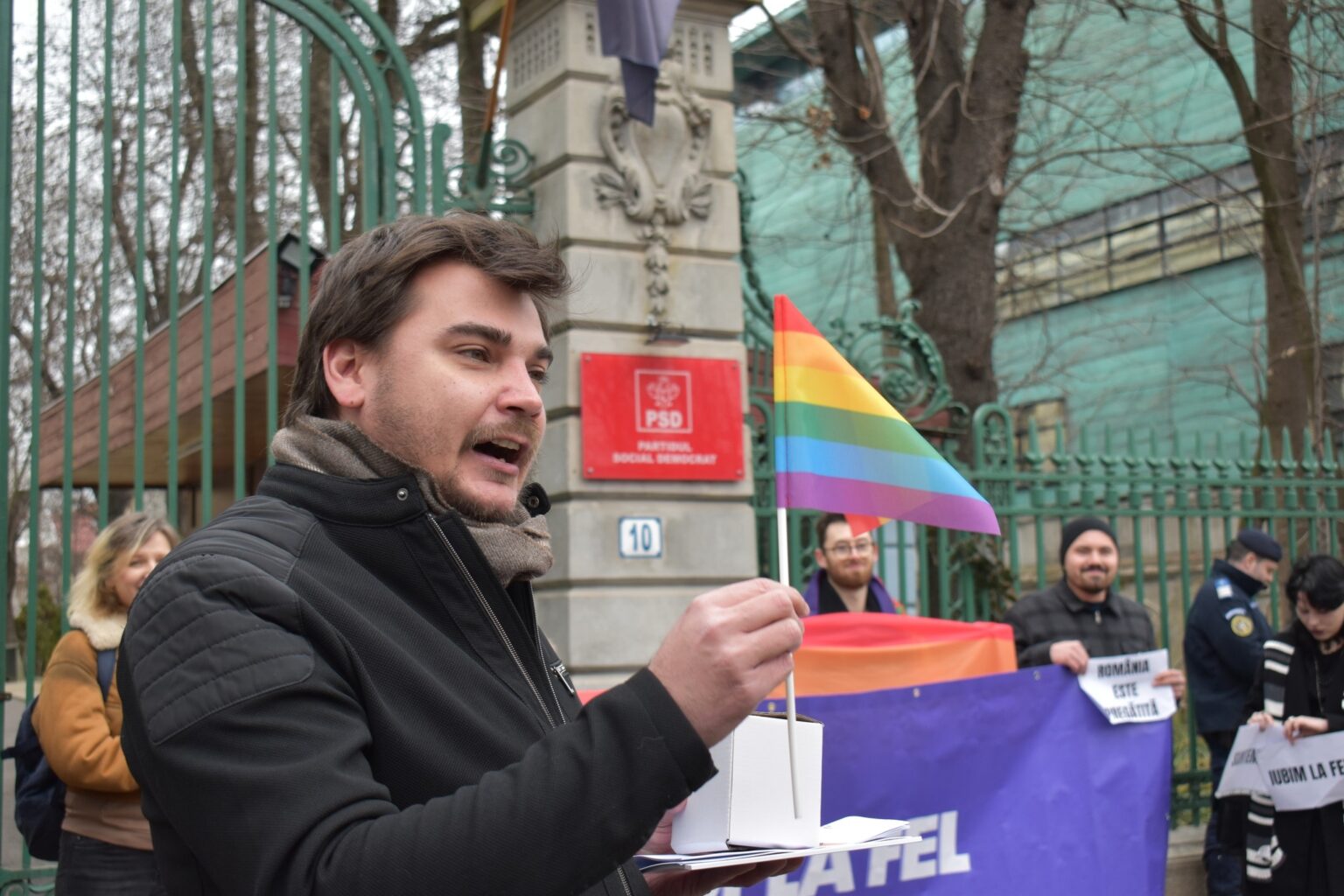
As the ILGA-Europe annual conference approaches, we turn our focus to one of the local co-hosts, MozaiQ, an organisation that has played a crucial role in shaping the LGBTI movement in Romania. Vlad Viski from MozaiQ shares what hosting the Conference means in the context of LGBTI rights in Romania.
Hi Vlad, tell us, what does hosting this conference mean for MozaiQ?
For us, hosting the ILGA-Europe Annual Conference is a testament to the growth of Romania’s LGBTI movement over the last decade. When we started in 2015, there were only one or two LGBTI organisations in the country. Today, there are more than 20 groups, not just in Bucharest but across six other cities. This transformation has been at the heart of MozaiQ‘s mission—building a movement from the ground up, creating spaces for underrepresented groups such as Roma LGBTI youth, transgender people, and the elderly.
The Conference is a reward for our efforts, and it shows that Romania is ready to connect with activists from across Europe. This Conference isn’t just about us; it’s about recognising that our work is worthy and that our movement is mature.
What does this mean in a wider political context for the LGBTI movement in Romania?
Romania’s political landscape has been anything but easy for LGBTI people. In ILGA-Europe’s Rainbow Map, Romania ranks 26th out of 27 EU countries on LGBTI rights, only ahead of Poland. Same-sex couples are not legally recognised, and gender recognition for trans people is an ongoing battle. Recent legal victories, such as defeating the 2018 referendum aimed at banning gay marriage and the 2020 bill that sought to outlaw gender identity education, and the 2024 landmark ruling from the EU Court of Justice affirming the mutual recognition of legal gender identities across Member States, show the importance of continued resistance.
We’ve managed to prevent Romania from following the path of Hungary or Poland, where democracy is being eroded. Our success in stopping these anti-LGBTI measures shows that civil society is strong, but the fight is far from over.
What is in the near future for the LGBTI movement in Romania?
With the upcoming Presidential and Parliamentary elections happening before the end of the year, the ILGA-Europe conference will play a role in keeping Romania’s LGBTI rights on the political agenda. Romania is being watched, and our movement is gaining power not just here, but across Europe. Romania has to stay on its European path. It has to provide a strong policy on legal gender recognition based on self-determination and create an environment in which LGBTI people are protected. It is essential that Romania continues to recognise the rights of LGBTI people as part of its commitment to the European path.
Safety and rights for lesbians in Europe

On International Lesbian Day, we highlight the recent report by the Committee on Equality and Non-Discrimination, emphasising the need for targeted policies to protect lesbians from violence and discrimination across Europe
Lesbian, bisexual, and queer (LBQ) women face profound challenges rooted in discrimination, violence, and systemic inequality. The recent resolution and report adopted by the Parliamentary Assembly of the Council of Europe on 03 October highlights the urgent need for comprehensive policies that address these issues. Intersectional discrimination, where sexual orientation and gender intersect for LBQ women and the marginalisation that stems from that intersection, complicates the landscape of human rights that LBQ women should have access to, requiring specific actions to ensure their protection.
The report outlines that LBQ women, including trans and intersex LBQ women, experience multiple forms of violence and harassment, which can manifest in both public and private spheres. Violence ranges from physical assaults and psychological abuse to online harassment, often targeting women who do not conform to traditional gender roles. For instance, a survey by the EU Fundamental Rights Agency highlighted that 33% of lesbian women in Europe have avoided public spaces out of fear of violence or harassment, demonstrating the pervasive atmosphere of insecurity they face.
This violence is intensified for racialised LBQ women, who navigate an additional layer of discrimination. The report notes that racial stereotypes can subject them to heightened prejudice, affecting their access to healthcare, housing, and employment. Many racialised LBQ women report feeling pressure to conform to heterosexual norms, further marginalising their identities and experiences.
The effect of anti-gender movements
The increasing influence of anti-gender movements across Europe worsens these issues, aiming to silence and delegitimise the rights of LGBTI people, particularly LBQ women. The report emphasises the need for legislative frameworks that protect human rights, asserting that all women should have equal access to the protection and support guaranteed by international conventions, such as the Istanbul Convention. The resolution calls for Member States to enact anti-discrimination laws that address not only sexual orientation but also gender identity and expression and sex characteristics, creating an inclusive environment for all.
Education challenges prejudice
Furthermore, the resolution highlights the importance of inclusive education programmes as a means of challenging prejudice. Educational institutions must serve as spaces for progress, promoting understanding of diverse identities while dismantling harmful stereotypes. By co-creating a culture of respect and inclusivity, we can work towards reducing the stigma and violence faced by LBQ women.
Comprehensive policies
To move beyond mere visibility and call for actionable change, the resolution notes that governments must adopt comprehensive policies that protect the rights of LBQ women, ensuring that their voices are heard in legislative processes. This includes but is not limited to recognising the parental rights of same-sex couples, ensuring equitable access to healthcare, and supporting emergency shelters that cater specifically to the needs of LBQ women.
By adopting the recommendations presented in the resolution, we can create a safer and more inclusive Europe where every lesbian can live authentically and with less fear of violence or discrimination. It is crucial to transform visibility into meaningful action, ensuring that no one is overlooked in the continuous fight for equality.
Annual Conference logo launch: The Power of Curaj
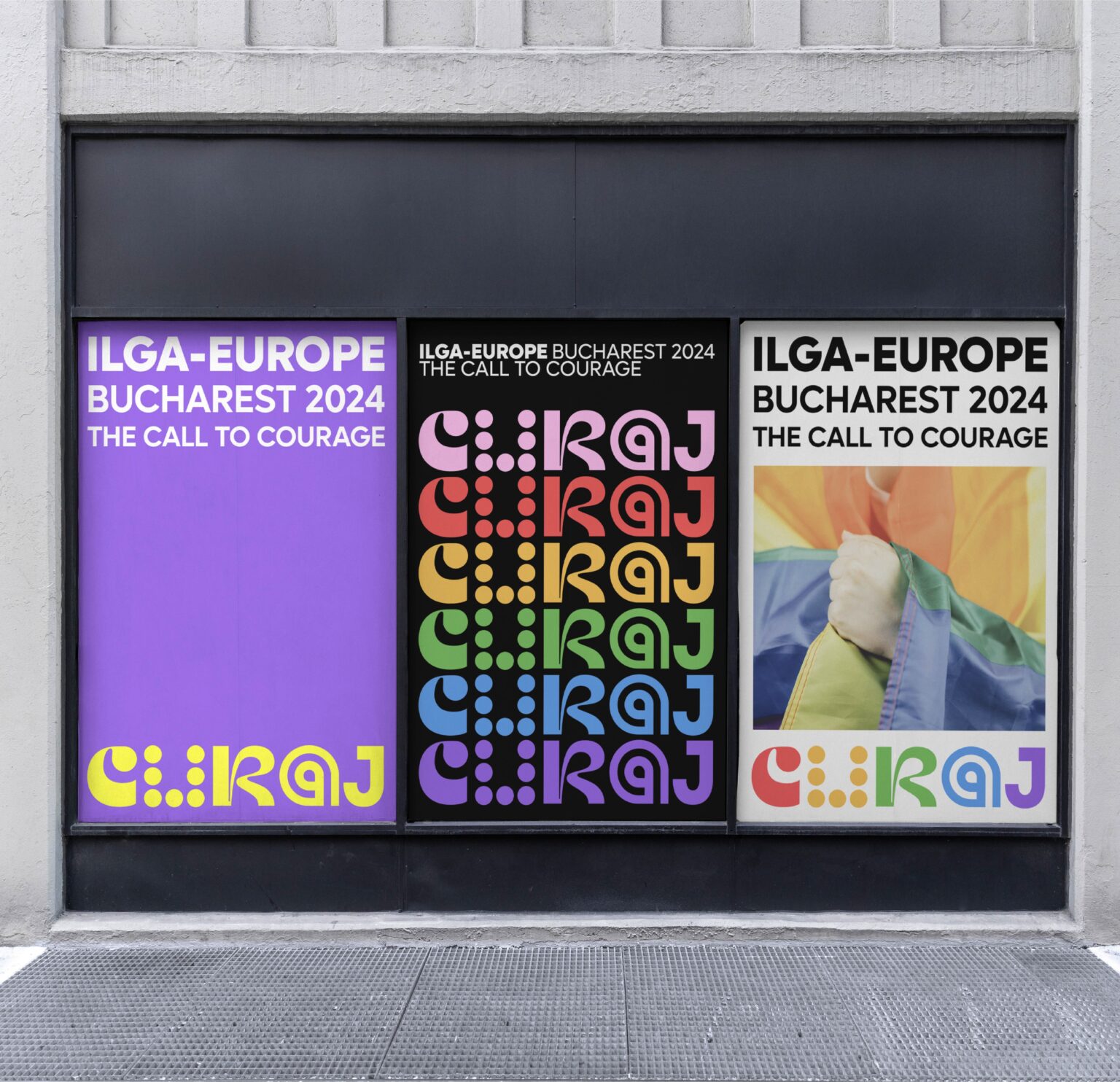
Learn about the courage captured in our branding for this year’s ILGA-Europe conference
As we launch our new logo for the ILGA-Europe conference in Bucharest, we present to you a word used in everyday Romanian life: ‘curaj’. This term, which means ‘courage’, encapsulates our theme this year, ‘The Call to Courage’ and serves as a powerful reminder of the great bravery shown by our activist movement, often in the most challenging circumstances, and the collective courage we need to inspire in each other as we go forward.
Meet the designer
This year’s designer, Vadim Carazan, has been working in design for 12 years in Romania. After years of freelancing, he established his own studio with a team of employees, called wegrow. While he now delegates most of the projects, this was one he chose to undertake himself. When designing, he wanted to challenge himself, since using a word as a logo is considered quite “out of the box” in the designer world.
About the logo
Here is what Vadim had to say about the process of designing the logo:
“Language plays a crucial role in shaping our perceptions and emotions, and the Romanian language offers a unique perspective on courage. The word “curaj” (pronounced koo-rahzh) stands alone as a compelling call to action. In everyday Romanian life, it is commonly expressed in various situations, such as encouraging someone before they leap to the unknown or offering support to someone facing a difficult decision. This cultural resonance transforms “curaj” into more than just a word; it becomes a heartfelt nudge toward bravery and self-empowerment.”
“The design of our logo reflects the essence of ‘curaj’ in its simplicity and strength. Each letter varies in shape and style, symbolising the rich diversity within the LGBTI community – you can be a ‘C’, or a ‘U’, or any other shape and letter! The design celebrates quirkiness, individuality, and the spectrum of experiences that make our community unique. This playful yet meaningful approach represents the importance of embracing one’s identity and self-expression.”
“While ‘curaj’ is deeply rooted in Romanian culture, its message of courage resonates universally within the LGBTI movement. It embodies our shared experiences – standing up for our rights, embracing authenticity, and nurturing a culture of inclusivity. By centring this word in our branding, we not only honour the local context but also highlight our commitment to making connections and empowering activists. This choice serves as a reminder that we are all part of a broader movement, united in our quest for equality and justice.”
Curaj in Bucharest
We are big fans of what Vadim has done with the logo. It represents so clearly every element of the theme of our conference, while rooting it in Romania, where we look forward to being with over 400 activists from October 16-19, hosted by local organisations Accept and Mozaiq. It promises to be a pivotal moment for the LGBTI movement in Europe and Central Asia, as we come together in a vibrant, engaged and courageous space to connect, learn from each other, have great fun, and re-energise for the work ahead.
25 years of bi+ visibility and the rise of the Bi+ Equal umbrella
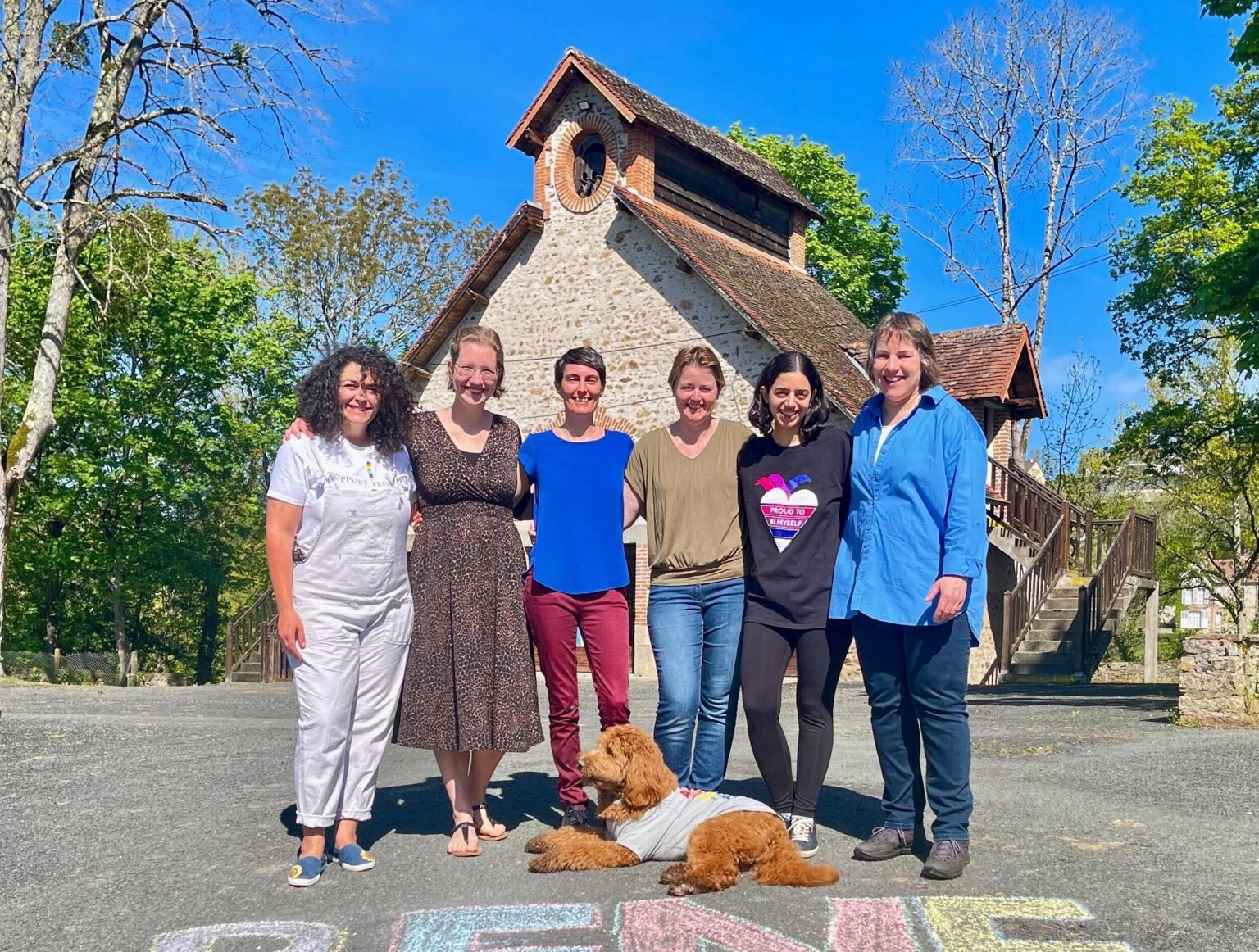
As we celebrate 25 years of Bi+ Visibility Day, today’s blog is all about a newly organised initiative that’s gaining momentum in Europe.
For today’s blog, Barbara Oud, Soudeh Rad, and Jantine van Lisdonk from Bi+ Equal, an emerging bi+ umbrella organisation working to reshape how bi+ people and bi+ equality are understood and supported across Europe, talk about the group’s mission, commitment and future plans. Bi+ Equal is an initiative created by and for bi+ people, aiming to fill the gaps in representation and advocacy that have often left bi+ voices unheard in broader LGBTI spaces.
Bi+ equality
At the heart of Bi+ Equal’s mission is the commitment to advocate for equality and inclusion for all bi+ people across Europe. Bi+ is an inclusive umbrella term that encompasses anyone with a sexual orientation focused on more than one gender. This includes those who identify as bisexual, pansexual, queer, or may choose not to use any specific label for their sexual orientation. The aim is to challenge the monosexual norm, also known as monosexism, which all bi+ people face, regardless of how they identify. Bi+ Equal envisions a pan-European movement that advocates for bi+ equality, ensuring the rights and visibility of all non-monosexual people.
A useful framework for understanding the complexity of being bi+ is the AIB model, which breaks down sexuality into three components: attraction, identity, and behaviour. Unlike monosexuality (attraction to only one gender), where these elements tend to align, in bi+ people, these circles don’t always overlap, reflecting the unique and varied experiences within the bi+ community.
Why we need a bi+ movement in Europe
A bi+ movement is crucial because it addresses the specific needs and challenges faced by bi+ people. The pervasive monosexual norm — the assumption that people are exclusively attracted to one gender — makes it difficult for bi+ people to be recognised fully in both LGBTI and wider societal contexts. Many bi+ people face unique forms of erasure, discrimination and misunderstanding, even within the LGBTI community, highlighting the importance of a bi+ movement dedicated to addressing these issues. As Barbara puts it, ‘We are the biggest group under the LGBTI umbrella, but we remain largely invisible. We need to work on visibility and equality for bi+ people.”
A bi+ entity can ensure advocacy for bi+ rights and provide dedicated spokespeople who can represent bi+ voices and priorities in policy-making and public discourse.
Co-creating the future of a Bi+ umbrella entity
Bi+ Equal’s work is by and for the bi+ community. A key component in order to create this entity and decide whether it should be an organisation, a network, a collective or community, or any other type of grouping, is Bi+ Equal’s newly launched survey. Designed to assess the state of bi+ activism across Europe and capture the lived experiences and needs of bi+ people, this survey not only reflects the diversity within the bi+ community but also aims to guide the co-creation of future priorities for the movement.
By centering bi+ voices and experiences, Bi+ Equal is helping to shape the future of bi+ activism in Europe. Bi+ people are encouraged to participate in the survey and join the movement, as our insights and involvement are vital for creating a vibrant, inclusive bi+ community that advocates for our shared needs and rights. If you wish to participate in the survey, send an email to research@biplusequal.org, and you will receive a personalised (and anonymous) link.
Boost your communications and campaigning skills with our free, easy-access sessions for LGBTI activists
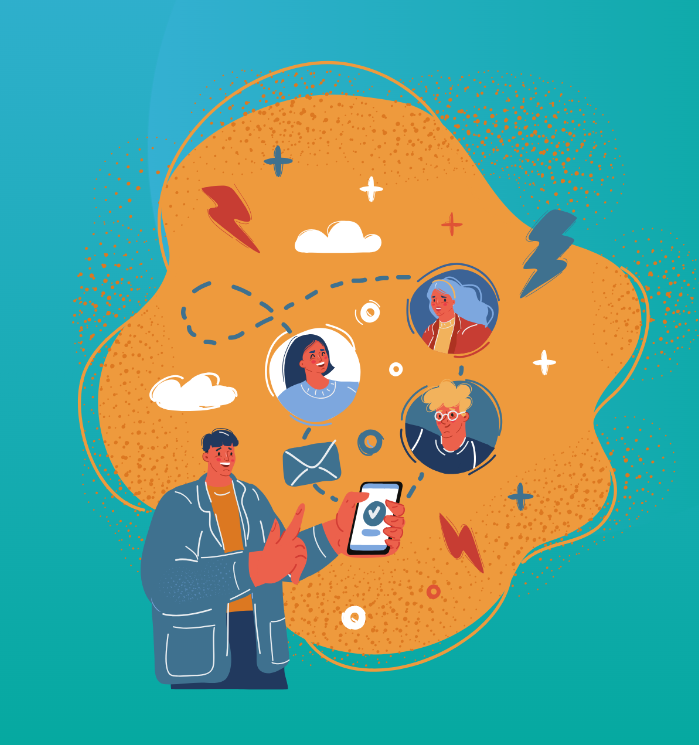
In the ever-evolving landscape of LGBTI activism, staying ahead with the right tools and strategies is essential. At ILGA-Europe we offer free training from experts in the field of strategic communications and it’s easily accessible from wherever you are. Find out more in today’s blog.
Are you taking advantage of the opportunity to access free, practical resources to enhance your communications and campaigning skills as an LGBTI activist or organisation? Our Skills Boost sessions bridge the gap between broad online resources and in-depth, hands-on coaching, offering activists practical training on topics that matter most. These sessions are designed to be engaging, relevant, and most importantly, actionable.
Whether you’re just starting or looking to upgrade your approach, our Skills Boost sessions offer expert guidance and personalised feedback, making it easier for you to implement what you learn. On top of that, there is space for peer learning, because you can give and receive feedback from other activists who are doing the same or similar work in their contexts.
Check out a few past Skills Boost sessions below, and take the opportunity to sharpen your skills and join a growing community of activists committed to making a real impact!
Skills Boost on Data Visualisation for LGBTI Communication
Communicating with visuals is more important than ever. This session focused on how LGBTI activists can transform complex data into compelling visual stories. Using data from our Rainbow Map, participants were guided through the process of creating powerful visualisations—no design experience required.
Skills Boost on Effective Fundraising Campaigns for LGBTI Activists
This session focused on creating successful fundraising campaigns targeting individual donors. The workshop provided insights into best practices and real-world examples to inspire effective fundraising efforts.
Skills Boost for LGBTI Activists: Media Interview Practice
Getting your message across in TV interviews can be daunting. This session offered practical guidance on how to prepare for media appearances, particularly in TV interviews. Participants learned about crafting messaging, handling technical aspects of interviews, and navigating difficult questions—all with a focus on personal wellbeing.
Skills Boost on Digital Ads for LGBTI Groups
Led by digital consultant Jean O’Brien, this session explored how to maximise the impact of digital ads with little or no budget. From choosing the right platform to getting the most out of Meta ads (Facebook and Instagram), the workshop provided practical strategies for effective digital campaigns, even when resources are limited.
Skills Boost: Useful Communications Strategies for LGBTI Activists
This session demystified communications strategies for LGBTI organisations. Participants explored what makes a strong communications strategy and heard from organisations that have successfully implemented their own strategies.
Are you interested in joining our next Skills Boost?
Upcoming: Skills Boost on Useful Communications Strategies for LGBTI Groups – Take It to the Next Level
Join us on Wednesday, 25 September at 12:00 CEST for a 60-minute session where Ljubljana Pride will share how they developed multiple communications strategies for different areas of their work. Learn how to update your own strategy and decide if you need more than one. Register now to take your comms skills to the next level!